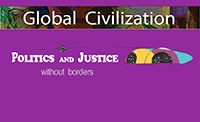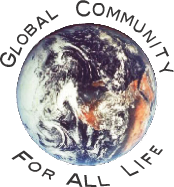Volume 16 Issue 4 December 2017
Global Parliament values and vision.
Back to December 2017 Newsletter
Table of Contents of February Newsletter
- Front Page with an introductory animation and copyrights of Global Community.
- Summary of paper with animations.
- Complete paper with related frames or images.
- Frames A1 to A5
Animation with speech text and music from Summary Paper
Key words: Global Community definition; Glass Bubble concept; Scale of Global Rights; ethics.
- Frames A6 to A8

Animation with speech text and music from Summary Paper
Key words: Values that kept human beings alived from ancient time to today's Global Civilization; most important Global Commons; Commons Trust Fund; Earth rights; Global Ministries; global life-support systems; Scale of Global Rights.
- Frames A9 and A10
Animation with speech text and music from Summary Paper
Key words: Global Civilization definition; Global Law; Global Protection Agency (GPA); Vision concerning our species survival and including all other lifeforms on Earth; the rights of peoples to life, clean air, freshwater, security, and of a healthy environment.
- Frames A11 and A12

Animation with speech text and music from Summary Paper
Key words: Global Peace Movement, learning to empathise (kindness, compassion, understanding and respect) with people; religion, faith and ethics; responsibility of managing Earth and its resources; foreign investments and trade must protect and improve social and environmental rights, not just the economy; global sustainability; global resources protection; security cannot be achieved through the military; protection of the global life-support systems.
- Frames A13 and A14
Animation with speech text and music from Summary Paper
Key words: Ecosystems on the planet; ecodiversity and cultural diversity; Nature services to all life on Earth; habitats and ecosystem services; demands resulting from the socio-economic system of a particular country have to find their limits in the protection of the global ecosystem; all these crises are due to human activities, our ways of doing business and trade, and to our ways of consuming resources.
- Frame A15
Animation with speech text and music from Summary Paper
Key words: Global Parliament short and long terms solutions to saving all nations; Scale of Global Rights; Federation of Global Governments; Global Protection Agency (GPA); Global Rights year one; Global Movement to Help; Vision of Hope and Love away from despair and social chaos; Earth Environmental Governance; Primordial Human Rights.
- Frames A16 to A20
Animation with speech text and music from Summary Paper
Key words: Global Parliament Constitution; an union in the form of nine (9) or more Global Governments; Federation of Global Governments; Global Movement to Help offers Essential Services to serve the people of all nations, all life on Earth; Global Parliament shall be composed of four (4) bodies: the House of Elected Representatives, Federation of Global Governments, House of Advisers, the Executive Council; Global Parliament Constitution.
- Frame A21
Animation with speech text and music from Summary Paper
Key words: Global Government of North America (GGNA); Global Community ethics gives humanity the moral foundation for a better individual and community; replacing the 1948 Universal Declaration of Human Rights by the Scale of Global Rights; sovereignty and land ownership; land and natural resources of the planet are a common heritage and belong equally to everyone as a birthright; Criteria of Global Community Citizenship; Global Citizens Rights, Responsibility and Accountability Act; a planetary biodiversity zone now under the protection of the Global Protection Agency (GPA); a planetary state of emergency; Global Government of North America (GGNA) to govern in accordance with the Global Constitution.
- Frames A22 and A23
Animation with speech text and music from Summary Paper
Key words: Global Parliament Constitution; Global Parliament is founded on the indivisible universal values of human dignity, freedom, equality and solidarity; it is based on the principles of democracy and the rule of law and by creating an era of freedom, security and justice; Earth management and good governance is now a priority and a duty of every responsible person on Earth; each Global Government is made more responsible and accountable to the people of member nations within the region where it operates; essential services to the people of each member nation are now the most important global rights on the Scale of Global Rights and are protected by the Global Protection Agency (GPA) of each member nation; participating member nations need to give their approval to the GPA; the GPA is a short term solution, an immediate and efficient response to help; there are also long term solutions; a Global Government is concerned not only with economics and trade, but also with the environment, health, agriculture, education, energy, food, social, cultural and many other essential aspects; each Global Government takes a larger share of responsibility of the specific region where it operates, and be more accountable to the people of that region.
- Frames A24 and A25
Key words: The Global Protection Agency (GPA) will train and lead a global force, bypassing traditional peacekeeping and military bodies such as the United Nations and NATO; the GPA will enforce the law; the establishment of the Global Protection Agency (GPA) to fight against the growing threat to the security of all Peoples, all life on our planet, and to fight against global crimes; broadening the traditional focus of the security of states to include both the security of people as well as that of the planet.
- Frame A26
Key words: Earth governance is about the rights of states to self-determination in the global context of Global Community rather than the traditional context of a world of separate states; Global Parliament ensures state governments that it will obey the principle of non-intervention in domestic affairs, it will also stand for the rights and interests of the people within individual states in which the security of people is extensively endangered. A global consensus to that effect will be agreed upon by all Member Nations.
- Frames A27 and A28
Key words: The formation of several global ministries for the proper governance of Earth; Humanity sees the need to manage the world affairs in several aspects of our lives; global ministries will be given power to rule themselves in harmony with each other; Global Ministry of World Population; Global Ministry of Essential Services; Ministry of Global Resources; Global Ministry of Water Resources Protection.
- Frame A29
Key words: We need leadership in the protection of all our natural resources, in peril because of what we do and what that does to our planet. We are facing a fresh water crisis. We are facing a food crisis. We are facing a crisis over deforestation. And we are facing crises in our oceans. While carbon emissions from fossil fuels pollute the air, land and our oceans, we are facing the climate change crisis. But all these crises are due to human activities, our ways of doing business and trade, and to our ways of consuming resources. Now is the time to press for leadership. When you do exploration work, develop, manufacture, produce, mine, farm or create a product, you become legally and morally responsible and accountable of your product from beginning to end (to the point where it actually becomes a waste; you are also responsible for the proper disposable of the waste). This product may be anything and everything from oil & gas, weapons, war products, construction products, transportation and communications products and equipment, to genetically engineered food products. All consumer products! All medical products! All pharmaceutical products!
- Frames A30 to A32
Key words: Social justice consists in sharing wealth with a view to greater equality and the equal recognition of each individual's merits. All persons within a given society deserve equal access to goods and services that fulfill basic human needs.The Global Community Global Justice Movement has many inter-related components: monetary, social, economic, environmental, democracy, and peace. Global Civilization represents all global citizens, all lifeforms, and stands for global justice. Political ethics deals not mainly with ideal justice, however, but with realizing moral values in democratic societies where citizens disagree about what ideal justice is.
- Frame A33
Key words: A very important legislation is the Global Citizens Rights, Responsibility and Accountability Act which, after its approval by Global Parliament, will define rights, responsibility and accountability of all global citizens. Each and everyone of us will make decisions, deal with one another, and basically conduct our actions as per the Act. Global Law includes legislation covering all aspects of human activities. The GPA will enforce the law. And that is how we can stop the global warming of the planet and protect the global life-support systems, thus largely improving the quality of life of the next generations. As we enact global law, we will begin to take on a much deeper kind of global leadership, one that can catapult the whole planet forward into a future where a beneficial Global Parliament is able to cope with global problems.
- Frame A34
Key words: We are all responsible for the creation of global warming, and there are plenty of observable effects. Greenhouse gases are accumulating dangerously in the Earth's atmosphere as a result of human activities, and temperatures are rising globally due to these activities. Climate changes have to be manage without delays. Corporations are required to expand their responsibilities to include global rights, the environment, community and family aspects, safe working conditions, fair wages and sustainable consumption aspects. Despite humanity's success in feeding a growing world population, the natural resources on which life depends, such as fresh water, cropland, fisheries and forests, are increasingly depleted or strained. In this millennium, population growth continues, meaning that more people will be sharing such finite resources as fresh water and cropland. Global Community is declaring a moratorium on world population, the fertility rate and immigration applications all over the world, on all applications for immigration, until applicants from any religious or cultural background have satisfied completely Global Community standard for a population fertility rate of 1.3 children per family. The problem with world overpopulation is everybody’s problem. Until tangible progress is made no immigrants should be accepted. That is Global Law. Overpopulation is a form of population warfare. It is the use of a very high fertility rate to conquer a nation, and that could mean as many as or more than 2.1 children per family. It is a form of cultural and/or religious aggression and invasion by having a much too high number of new born babies. For instance, there has been a rapid increase in population among Muslims to the extent that in 20 years all of Europe and North America are expected to be mostly Islamic. The influx of Latino immigration into the western states of the USA will also have the effect of a population warfare. Now, obviously what immigration does is to infringe into the most important rights on the Scale of Global Rights: Sections 1, 2, and 3. It amounts at creating and stressing the world overpopulation problem which is way far more destructive than conducting military warfare. Global Community condemns all types of warfare we see in the world today: military, economic and population. Surely the rights to protect the existence of all life on our planet are more important than cultural and religious rights. Sections 1, 2 and 3 on the Scale of Global Rights are certainly more important than Section 6.
- Frames A35 to A37
Animation with speech text and music from Summary Paper
Key words: Global political parties are certainly the next best thing to talk about after replacing the United Nations by Global Parliament. Actually why wait! We all know it is coming soon. We all know the UN is on its way out! This is the 21st century, and the old ways have to go for humanity survival, for all life on Earth survival. The world wants an organization dedicated to the welfare of all Peoples and to the protection of the Earth's environment and the global life support systems. The world wants an organization dedicated to the welfare of all Peoples and to the protection of the Earth's environment and the global life support systems. Such an organization must not be governed by powerful lobbying groups. We see entire nations making choices based on what is good for themselves, today self-interests, versus what is good for the next generations and all life on the planet. In other words, they make choices between international politics versus global politics. International politics are driven by national interests, self-interests, and powerful lobbying groups, while global politics are about the survival of all of us on the planet. Global politics is about doing what is right for humanity and all life on the planet. Global politics is about doing what is right for all of us now and in the future, and for all life on the planet.
Complete paper with related frames or images.
Frames A1 to A5
Global Community is this great, wide, wonderful world made of all these diverse global communities. The concept of 'a global community' is part of the 'Glass Bubble concept' of a Global Community. It is an imaginary space enclosed in a glass bubble. Look up, look down, to the right, to the left, in front and behind you. Imagine all this space is inside a giant clear glass bubble. This is "a global community." Inside this global community is everything a person can see. Every creature, every plant, every person, every structure that is visible to him(her) is part of this "Global Community. "
By focusing on familiar ground in this manner it can be taught that every living thing within the glass bubble is there because his or her food is there, his or her home is there, all he or she needs to survive is there. And every creature will stay as long as what his or her needs remain to be available within that "Global Community".
Wherever you go, you are inside a "global community'. Every thing, every living creature there, interacts one upon the other. Influences inter-weave and are responsible for causes and effects. Worlds within worlds orbiting in and out of one another's space, having their being. Your presence has influence on everything else inside your immediate Global Community. Learn to be aware of that and act accordingly to create good and to help.
Now let us explore this Global Community that we have just described and discover why each member is important ~ each bird, each tree, each insect, plant and human being ~ and how all work together to create a good place to live.
To sustain Global Community, humanity and all life, from the experience in your life and local community tell us:
Why are you important to this "Global Community"?
What bothers you about it? Anything need to be done?
What is very, very important?
What unimportant things need to go?
It has to be taught to children very clearly all life forms interact and depend upon other life forms for survival. They need to know "reasons why" ignorance of Nature's laws cause such damage, and why working in harmony with Nature produces such good results.
Now let us explore this Global Community that we have visited and discover why each member is important. You walk like a giant in this Global Community. To all the tiny members you are so big, so powerful, even scary…
You can make or break their world. But by knowing their needs, and taking care, you can help your whole Global Community be a good one.
From the experience in your life and local community tell us:
* Why are you important to this "Global Community"?
* Why is it important to you?
* What do you like about it?
* What bothers you about it?
* Anything need to be done?
* What is really good there?
* What is very very important?
* What is not so important?
* What is not good?
* What is needed to keep the good things?
* What could make them even better?
* What could you do to keep the good things good?
* Could they help get rid of bad things?
* What unimportant things need to go?
* How could you help get rid of these things?
to sustain Earth, humanity and all life.
Let each child be aware he needs to grow up to be a person who helps. She/He creates his own future in this way. He becomes a responsible citizen, a global citizen.
This may or may not inspire some sort of creative project of what "could be" to aid this Global Community to remain healthy.
To interact knowledgeably within one's global community has to be taught ~ especially to urban children. It has to be brought to them very clearly all life forms interact and depend upon other life forms for survival. They need to know reasons why ignorance of nature's law causes such damage, and why working in harmony with nature produces such good results. The world is already witnessing effects of global warming, itself being caused by ignorance and indifference of nature's law.
The concept of the Glass Bubble was extended to include the planet Earth and all the global communities contained therein.
The following definition of The Global Community was found appropriate:
Global Community is defined as being all that exits or occurs at any location at any time between the Ozone layer above and the core of the planet below.
This definition includes all people, all life on Earth. And life claims its birthright of ownership of Earth, and so does SoulLife, also named the Soul of all Life, Soul of Humanity or God’s Spirit. By extension, the expression Global Community includes the entire Universe, space and time, all matter, galaxies, dark matter, all particles and all unknown parts of the Universe yet to be discovered.
Again, Global Community also includes all Souls, God’s Spirit, and that makes it different than just saying Global Community is the Universe, or that God is the Universe. God is everywhere within the Universe and beyond, elsewhere. Guiding Souls serving God are always helping the formation of Life in all places and times. Global Community ethics embrace the process of understanding what is truly important for humanity’s survival on our planet, and that is the Scale of Global Rights which give Peoples the moral foundation for a better individual and community. Global Community ethical grounds are practical, real, and applicable for all women and men of good will, religious and non-religious. Fundamental definition of the expression Global Community
This is the fundamental definition of the expression "Global Community". This definition includes all people, all life on Earth. This is the fundamental definition of the expression Global Communit It also implicitly says that no-one in particular owns the Earth but we all own it together. Not just us people, but all life on Earth owns it. The beginning of life stretches as far back as 4 billion years, and so Life claims its birthright of ownership of Earth, and so does the Soul of all Life, the Soul of Humanity. Evolution, Creation and now, Guiding Souls Throughout this paper the land ownership of the Earth means ownership of the land and of all other Earth natural resources.
Following this thinking we see land ownership is no longer a problem. The Earth and all its natural resources belong to all the "global communities" contained therein. A village, or a city is "a global community" and owns the land around its boundaries. Along with Global Community, it has ownership of all natural resources within its boundaries.
One could think of a typical community of a million people that does not have to be bounded by a geographical or political border. It can be a million people living in many different locations all over the world. Global Community is thus more fluid and dynamic. We need to let go the archaic ways of seeing a community as the street where I live and contained by a border. Many conflicts and wars will be avoided by seeing ourselves as people with a heart, a mind and a Soul, and as part of a community with the same.
We can no longer perceive ourselves as a People who could survive alone and a People who does not need anyone else. We belong and depend to this much larger group, that of Global Community, Global Civilization. The 21st Century will see limitless links and interrelationships within Global Civilization.
Every single human being must deal responsibly with the affairs going on in his (her) own 'global community' ~ when a person takes personal responsibility for his own affairs ~ he becomes empowered as a person. He can then reach beyond his own property and family, and help to work with others living in and around, even a part of the local community he lives in ~ the villages, the town community, the surrounding territory, and so on.
The key is personal responsibility. Therefore the individual is the important element, one who takes responsibility for his community. This individual cares about jobs, homes, streets, the welfare and success of his community.
When a group of ordinary people realized they, personally, will make the changes they need in their fields, in their village. They can then find ways to bring these changes for all. There is a wisdom in the ways of very humble people that needs to be used. Every humble person deserves to have ideas respected, the courage to develop his own life for the better and for the good of all. Sound solutions to help manage and sustain Earth will very likely be found this way. Everyone can help assess the needs of the planet now and propose sound solutions for its proper management, present and future.
Global Civilization, the human family, is finding its role in the universe, a higher purpose and a meaning. We now can celebrate life.
A sustainable world can be built with the help of a very powerful entity: the human spirit. Community participation generates the energy needed to sustain the planet and all life. Religious and environmental communities have formed a powerful alliance for sustainability.
A new symbiotical relationship between that of religion and the protection of the global life-support systems has begun to take place all over the world. Religious rituals now support the conservation efforts and play a central role in governing sustainable use of the natural environment. Major faiths are issuing declarations, advocating for new national policies, and creating educational activities in support of a sustainable global community. Global Civilization is establishing a symbiotical relationship between spirituality and science, between our heart and mind, and God, between religion and the environment.
On and around May 26, 2017, millions of people around the world will join together in a global call to celebrate Life, the gift to the universe from God.
As part of the Peace Movement of Global Civilization, the human family, let us celebrate with all Peoples of the world , and all life, for the annual Celebration of Life Day. Life is the most precious gift ever given by God to the universe and this event needs to be celebrated.
Global Civilization is asking all Peoples of the world to participate in this celebration of Life in your own community.
Let our time be a time remembered for the awakening of a new reverence for life, the firm resolve to achieve sustainability, the quickening of the struggle for justice and peace, and the joyful celebration of life. Let our expanding consciousness blend with that of the Soul of Humanity.
With the advance of this Century, one tends to dream of a new Eden.
The signals of what the world could become are already apparent in the life-style of to-day's children.
From childhood our little ones have been privileged to enjoy group activities. They develop a circle of friends from many ethnic backgrounds, boys and girls together. They learn consideration for others early on, the rewards of sharing, and a special code of conduct necessary for a group to function as an harmonious whole. Global co-operation in the making!
By the time our children have become teen-agers the group of friends has virtually replaced the family unit in importance. It is most apparent in High School years. As they enter University the group of friends has solidified to the point where a group-home will be rented, all sharing the cost. A basic symbiotical relationship!
These young people habitually hold two or three part-time jobs, or engage in some entrepreneural activity, for money is regarded as the energy source for their way of life.
They see money for what it is - energy to use for good.
They spend their extra money investing in the money-market ~ even real estate. They finance their own educations for they are keenly aware they go nowhere if they are not intellectually prepared.
Freedom of lifestyle is more important to them then mounds of possessions. These young people are not trapped by "things" although they own the best of sports equipment and outdoor clothing, being very health conscious. They eat very well.
All of their lives they have been educated by osmosis through T.V., movies, computers, and on another level by enlightened teachers in sophisticated educational settings. They drive cars, some fly planes, all use machines of every kind every day. And all of these things, in conjunction with the close security of the group of friends, lay the ground work for a new life-style, this new world just beginning, in the care of these brave new souls.
And what a great, wide, wonderful world they have upon which to lavish their uninhibited imaginations!
They share their thoughts and feelings with their 'virtual friends' half way around the globe. No border is big enough to hold them back. Already they have a sense of what it takes to live in a group, to think alike. The seeds of global co-operation are in healthy grounds. From the poorest of them to the richest is created a unique bound, a symbiotical relationship.
Being outdoors-aware, these young people will be focusing on the air we breathe, the water we drink. Few of them really know where their food comes from for all their lives they have bought food in boxes from stores. They will have to address food supply ~ perhaps influenced by the food prepared for astronauts, but it will be health conscious food, with low preparation time.
Food was bountiful in the original Eden. It is hoped in the new Eden everybody will have enough to eat. Unfortunately, today, starvation in some countries forces people to kill and eat their animals. This means rare species have to be herded into safe areas to avoid extinction. Even oceans are filthy. Some people wonder if the giant world-wide business conglomarates, which have made so many marvellous philanthropic gifts to the world, will take it upon themselves to help the starving in an intelligent manner. Globalization could become the "god who will provide"!
The young adults in charge of our new Eden will benefit from the popularity of small businesses cropping up. It is to be expected they will have re-acted to the businesses in the past whose job-security plan was built on products with built in obsolescence, and the creation of one of our major new industries to-day-waste control! Garbage makes a lot of money! Our young people will be the first to grasp that fact! It will pay them handsomely not to allow this "creative energy" to escape their grasp!
Most of us are somewhat aware we have to unload. It is necessary to follow the job market at the first opportunity. Possessions are costly to buy, but far more costly to move across country. The result is Thrift Stores flourish and bulge at the seams! Department stores have empty aisles. Our new generation already exhibits the inner awareness: less is more.
Living with a group of friends in a Space Age may involve jobs in Space. Take Tourism for example. The Tourist Trade is making a very clear statement about its future ~ at present the practice is to take customers to all the remaining unique cultural outposts for the picturesque experiences ~ but since the aboriginal people who live there tend to ape their viewers with such alarming speed, soon the only place Tourism can advertise is Outer Space!
And if our group of friends works in Space their human mating practices will have to change to deal with extended periods away from Earth.
Furthermore, their children may be born in a gravity free environment. Will these babies have to be especially genetically altered to survive?
One very re-assuring fact is that the young people of to-day are interested in all the secret wisdom behind all the existing religions and sifting out the common truths. They seek the best of the best. They are aware of the Soul of Humanity and have established a spiritual symbiotical relationship with it, and thus with God. They seek the exaltation and merging of their Souls into one to gain strength, friendship, creativity, love and light.
Their childhood conditioning has prepared them to act on a firm understanding of what it takes to get along with others, working as a group.
They are educated to understand a broad panorama of human truths ~ all those universal needs and rights every one shares. The Scale of Global Rights has become an inner truth and the benchmark of the millennium in how they see all values. The Earth Court of Justice has brougth security, Peace and Justice for all. They no longer fear the unknown as Justice is for everyone and is everywhere, a universal constant.
Their idea of power is power over Self.
Each and every Self is dedicated to an idea for good that others can share together in creating this new Eden. Doing good and the well-being of the 'other' have become the basic building block of any symbiotical relationship.
Global Community's contribution to the welfare of humanity and to the children to be born is infinite. The work to make a better world endures. We are seeing the birth of Global Civilization.
The age of global co-operation and symbiotical relationships of all types are for the good of all. An age with a mind, a heart and a Soul of its own. A unique and wonderful age never seen before over the entire human history! An age with a vision to care for life and Earth! An age of the Soul!
What we have here is the birth of genuine group concern and unconditional support for the individual's well-being ~ a giant leap in human behaviour which could well change the functioning of global communities everywhere. We are becoming the human family. And Global Civilization has made grounds in Peoples way of life.
Over the past decades, Global Community has organized a Global Dialogue worldwide to probe the needs of all peoples for survival. Global dialogues are the source of new ideas and finding new ways for our survival as a species and taking along with us other lifeforms on the planet. Every day of every year global dialogues have made possible to probe the world about what may be the best vision to follow for humanity's survival this century. Results obtained have shown clearly that a significant part of the world population has approved a global ethic with the Scale of Global Rights as being the proper guide for this generation and next ones this century.
Global Community ethics embrace the process of understanding what is truly important for humanity’s survival on our planet, and that the Scale of Global Rights gives Peoples the moral foundation for a better individual and community. Global Community ethical grounds are practical, real, and applicable for all women and men of good will, religious and non-religious.
Global Community has given back responsibility to every citizen on Earth. Everyone shares responsibility for the present and future well-being of life within Global Community. We will work together in finding sound solutions to local and global problems. It would be wrong and dishonest to blame it all on the leader of a country. Most problems in the world must find solutions at the local and global community levels (and not assume that the leader alone is responsible and will handle it). There is a wisdom in the ways of very humble people that needs to be utilized. Every humble person deserves to have ideas respected, and encouraged to develop his or her own life for the better.
Sound solutions to help manage and sustain Earth will very likely be found this way. Everyone can help assess the needs of the planet and propose sound solutions for its proper management, present and future. Everyone can think of better ideas to sustain all life on Earth and realize these ideas by conducting positive and constructive actions. When there is a need to find a solution to a problem or a concern, a sound solution would be to choose a measure or conduct an action, if possible, which causes reversible damage as opposed to a measure or an action causing an irreversible loss; that is the grassroots process. Global Community can help people realized their actions by coordinating efforts efficiently together.
One of the greatest causes of disagreement in humanity's history have been the conflicting views of different religions. And at the same time it is religion that has most effectively fostered humanitarian actions. The question is, can the obvious benefits in different religions be approved and supported without approving that part of their faith with which we differ?
Allegiance to a faith dealing with the mysteries of life: Why are we here? Is there a future life? Is there a God? often provides meaning and incentives for a virtuous life. But each person must temper their belief by recognizing any virtue they see in peoples with a different hypothesis or religious beliefs about the mysteries of life. The Golden Rule Principle, also called the Ethic of Reciprocity by theologians, says: "Dont do to others what you wouldn't want done to you." Or treat others the way you would want to be treated. The Golden Rule has a moral aspect found in each religion or faith. It could be used as a global ethic. Every faith is unanimous of saying that every individual should be treated with the same respect and dignity we all seek for ourselves.
Promoting an action program for Ethics of Earth with these redemptive policies would quickly bring new attitudes of trust and hope, a change of heart worldwide. The principle of sharing has always formed the basis of social relationships in societies across the world. We all know from personal experience that sharing is central to family and community life, and the importance of sharing is also a key component of many of the world’s religions. Given the importance of the principle of sharing in human life, it is logical to assume that it should play an important role in the way we organise economies and manage the world natural resources.
Developing ethics that would save humanity from extinction will encounter numerous criticisms from individuals whose basic human rights will be violated. But that is to be expected! And there is no other way! Global Community has researched and developed the Scale of Global Rights to continue this process. On the Scale of Global Rights, primordial human rights and the protection of the global life-support systems and ecological rights are on top of the Scale. They are the most important aspects on the Scale. Applying the Scale into our ways of life will require sacrifices from people whose human rights will be violated because social values have different degrees of importance on the Scale. But this process is necessary because the 1% of the world population has already violated the basic human rights of most people on Earth and brought humanity and all life on Earth close to extinction.
The ethic proposed here provides no direct solution for all the extensive problems of humanity. The ethic is giving humanity the moral foundation for a better individual and community. Global Community offers a new global order with a vision of Hope and Love away from despair and social chaos. Global Community ethics offer fundamental moral behaviors and irrevocable standards. You need not be religious to make this vision yours. This vision is for all human beings regardless of their social origin, language, culture, sex, skin color or religion. Global Community vision creates new hopes, standards, ideals and goals for everyone to embrace freely, and live a life without fear. Global Community faith is about realizing this new global order will be better, safer, and more realistic after replacing the 1948 Universal Declaration of Human Rights by the Scale of Global Rights. To determine rights requires an understanding of needs and reponsibilities and their importance. The Scale shows social values in order of importance and so will help us understand clearly the rights of a community and its citizens. So now Global Community ethics includes a process based on the Scale of Global Rights. Global citizens have a binding responsibility for the welfare of all humanity and care for all life on Earth. Global Community ethical grounds are practical, real, and applicable for all women and men of good will, religious and non-religious.
Global Rights year one is new impetus of the Global Community to educate everyone about the need for a change in thinking and of doing things amongst all nations. We need to realize what is a priority, what is the most important, and what is the least important for our survival. We need a clear vision. We need a common vision. And we must all change! There are many important aspects of our lives we can longer do, or should never do anymore. They are destructive. Humanity and all life can no longer afford activities that destroy life and the global environment. And there are other activities we must do, certainly thousands of them, to assure the survival of life on Earth. In view of the planetary state of emergency we all must change, we must do things differently to give life on Earth a better survival chance.
And this is what Global Rights year one is about: to establish global fundamentals and a clear vision to follow.
In 1985, the Scale of Human and Earth Rights was first proposed as a replacement to the Universal Declaration of Human Rights. After several decades of research and development, many global dialogues, we still find the Scale as the best solution to global problems. The Scale has now been titled the Scale of Global Rights.
To achieve a balance of freedom and order, local communities must be given a larger responsibility for peace and care for Earth. Let towns and cities link with each other locally and across national boundaries in creating programs and in solving social and environmental problems. This will help foster the trust needed by nations to achieve lasting peace for all peoples.
As a first step, all nations can and should approve the first three sections on the Scale of Global Rights. The approval would supersede the political and physical borders of participating member nations. The Global Protection Agency (GPA) would have the approval from all member nations to give immediate help, bypassing normal government protocols. Somewhat like an emergency unit but at the global level. That is what those first three sections mean. They represent an efficient and immediate emergency response to help. First, participating member nations need to give their approval to the GPA. The GPA is a global organization much like the World Trade Organization (WTO) for trade between nations, the World Health Organization (WHO) for health, or the European Union, North American Free Trade Agreement (NAFT), South American Community of Nations (SACON) for trade and economics. The GPA offers an efficient emergency response to help. The GPA is a short term solution, an immediate and efficient response to help.
There are also long term solutions. As with the short term solution, the most significant long term solution is also related to the Scale of Global Rights. The Scale was entrenched in the Global Constitution and is thus the fundamental guide to Global Law. Now the Scale of Global Rights is also a long term solution and is also a part of the Global Movement to Help of Global Community. The Scale was designed to help all life on Earth. What would be preferable is that nations unite amongst themselves to help. Over time, we have seen the creation of the United Nations, the European Union, the South American Community of Nations, and the North American Free Trade Agreement. Except for the UN, these organizations are mainly concerned with trade and economics. Global Community offers a more meaningful union in the form of nine or more Global Governments. For instance the South American Community of Nations can be a Global Government by simply accepting the Global Constitution as a way of dealing between member nations. A Global Government is concerned not only with economics and trade, but also with the environment, health, agriculture, energy, food, social, cultural and many other essential aspects. The Federation of Global Governments is the place of meeting between Global Governments. The very first step of the Federation, and maybe the only one for several decades ahead of us, would be the approval of essential services amongst the participating member nations. The Global Community has researched and developed such services and listed them here. All of them are already in operation on a small scale.
The Federation of Global Governments is now applying more emphasis on the urgent need from the people of all nations to give everyone essential services. Global Community has already declared a planetary state of emergency to that effect.
We have shown that several events have contributed to the planetary state of emergency:
A) Widespread poverty and hunger in more than half the world population,
B) The global warming of the planet due to human activities,
C) Climate change,
D) Economic and military invasion of nations by the most powerful nations,
E) Absence of fair and democratic global governance at the United Nations and European Union, and
F) Our global environment and global life-support systems are threatened and critically damaged by human activities.
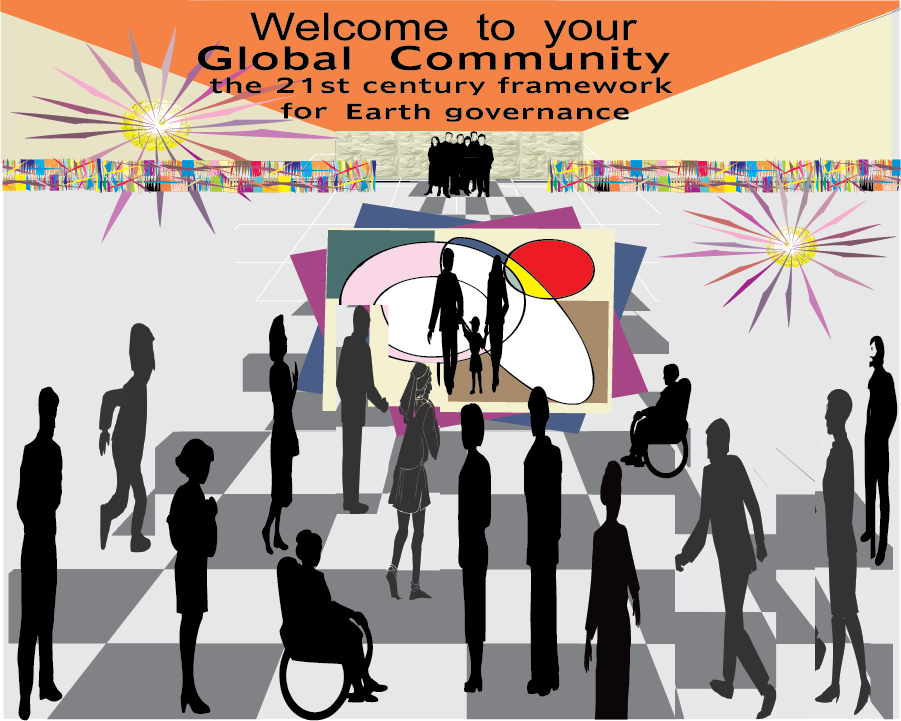
( see enlargement

( see enlargement

( see enlargement
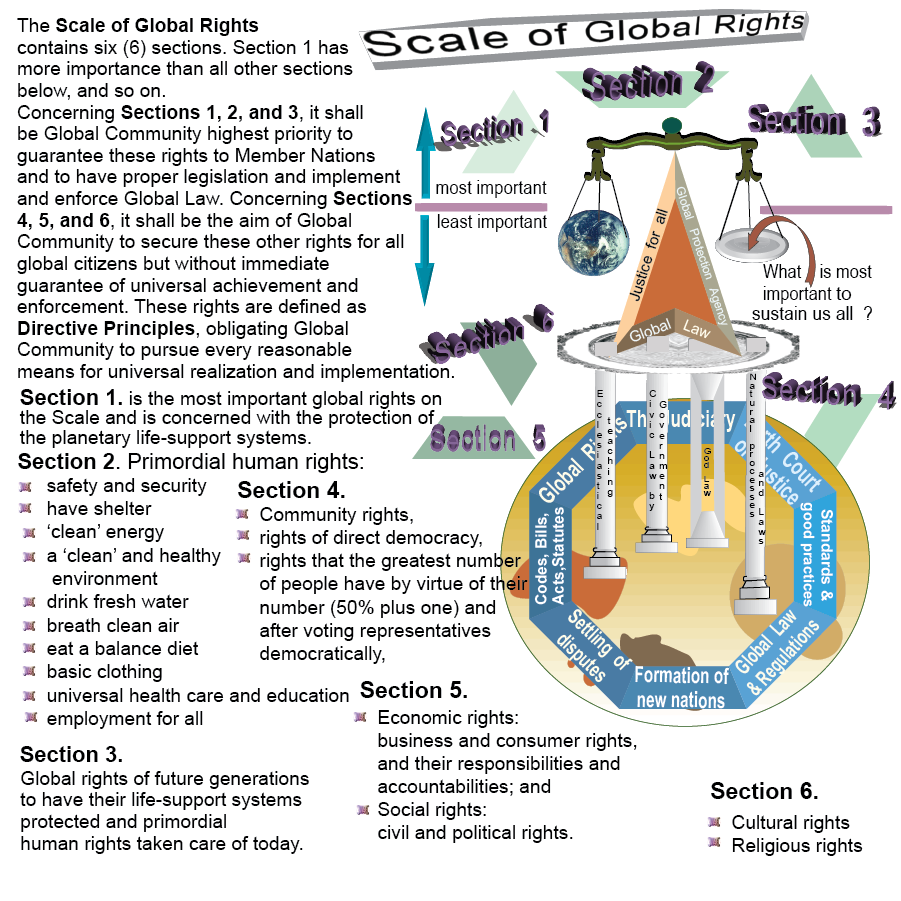
( see enlargement
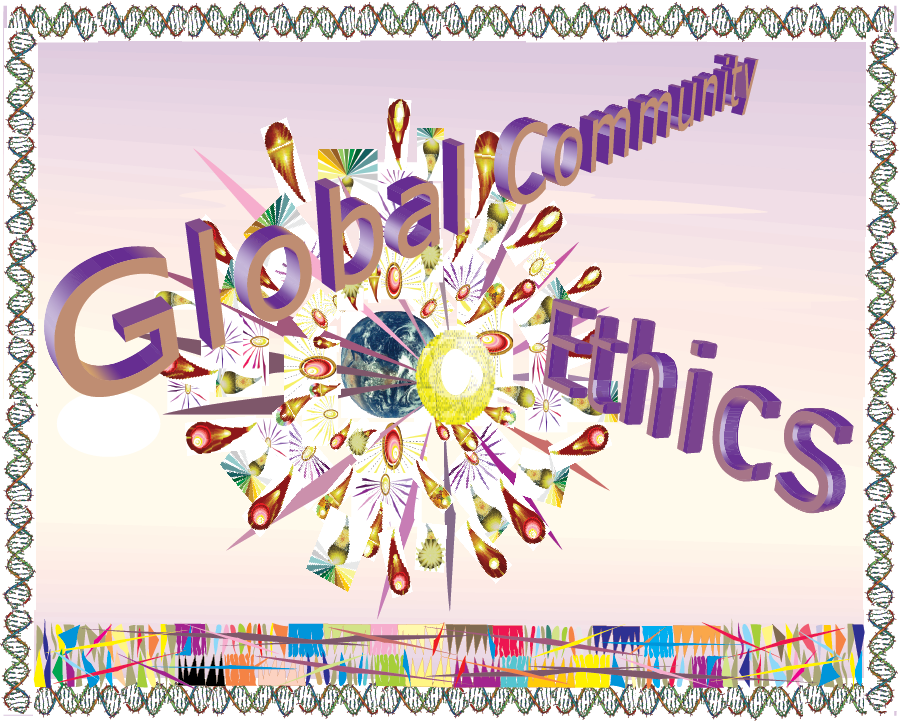
( see enlargement
Frames A6 to A8
Global Community values are timeless because Global Community has always been helping the formation of life in all places and times throughout the universe. Then life is let to evolve. Evolution and adaptation are the main driving forces of life. Advantages that explain the evolutionary success of humans include a large brain which enable high levels of abstract reasoning, language, arts, problem solving, sociality, and culture through social learning.
Global Community values did not all exist at first in the first stage of human evolution. But most of them gradually developed over time. Humans have survived over time because of those well developed human values.
Humans started to separate from the rest of the great apes 7 million years ago. The first modern form of humans, the Homo sapiens, evolved 200,000 years ago. Cave and rock paintings began to emerge on multiple continents about 30,000 years ago.
Over time, humans have established various forms of government, religion, and culture around the world, thus unifying people within a region and leading to the development of states and empires.
Now Global Community has claimed that all lifeforms are important and must be included as part of global ethics. It is not just about 'humanity survival' but about 'all lifeforms survival' we are fighting for. This is morally right for humanity's survival because each of us depends on the well-being of the whole, and so global citizens have respect for the community of living beings, for people, other lifeforms, and plants, and for the preservation of Earth, the air, water and soil.
Over ancient time to this day, morality in society made its way into our ways of doing business. So the set of behaviors that constitute Global Community ethic for a business evolved largely because they provided possible survival benefits to increase evolutionary success. Consequently, Peoples evolved socially to express emotions, such as feelings of empathy or guilt, in response to these moral behaviors. Humans developed truly moral, altruistic instincts. When looking across cultures of geo-cultural areas and across millennia, certain virtues have prevailed in all cultures, the major ones include wisdom, knowledge, courage, justice, love, truth, empathy, kindness, and social intelligence. These virtues were not always incorporated into the ways of doing business because the 1% business world became corrupted, greedy, no longer in line with humanity's survival on the planet, and more interested in keeping most of the wealth, resources and power for themselves keeping the remaining 99% of the world population in poverty.
But today we are going to incorporate these virtues and proper behaviors into corporate citizen global ethics.
Moral values can be identified across cultures, even if we do not accept a global understanding of principles: values including integrity, trustworthiness, benevolence, justice, and fairness. These values can be resources for finding common ground between believers and nonbelievers, and for conflicts needing of ethics to resolve their problems.
On the understanding that Global Community ethics are sets of self-perpetuating and biologically-driven behaviors which encourage human cooperation and symbiotical relationships, then we all can see why Global Community concepts and approaches to humanity's survival become so urgently needed today.
All social beings have modified their behaviors by restraining immediate selfishness in order to improve their evolutionary fitness. This is why humanity needs to correct the present business world and corporate citizens as most of the wealth on the planet is in the hands of the 1% of the world population while the remaining 99% of the people are badly taken avantage of and live in poverty.
Human morality, though sophisticated and complex relative to other lifeforms, is essentially a natural phenomenon that evolved to restrict excessive individualism of the 1%, including their human rights, that could undermine a group's cohesion and thereby reducing all life's survival on our planet. Obviously the 1% business world has to evolve along with society, and that means closing down businesses that aim at publishing cartoons to insult the Prophet Muhammad (GR)(GR) and Islam.
After making the proper adjustment to ways of doing business in the world, morality can then be defined as an accumulation of interrelated behaviors that cultivate and regulate complex interactions within social groups. These behaviors includes empathy, reciprocity, altruism, cooperation, a sense of fairness, symbiotical relationships, and have been included directly into the corporate citizen global ethics.
List of values humans have developed over time to survive as a species.
1. Proper shelter, health, education, and employment
2. Social justice and harmony, and widespread communications
3. Compassion, hope and caring
4. Global security and peace
5. Ethical and moral responsibility to life
6. Free-thought and creativity, and dialogue on issues
7. Leadership and taking charge, and symbiotic relationship for the good of all life
We are all members of Global Community. We all have the duty to protect the rights and welfare of all species and all people. No humans have the right to encroach on the ecological space of other species and other people, or treat them with cruelty and violence. All life species, humans and cultures, have intrinsic worth. They are subjects, not objects of manipulation or ownership. No humans have the right to own other species, other people or the knowledge of other cultures through patents and other intellectual property rights. Defending biological and cultural diversity is a duty of all people. Diversity is an end in itself, a value, a source of richness both material and cultural. All members of Global Community including all humans have the right to food and water, to safe and clean habitat, to security of ecological space. These rights are natural rights, they are birthrights given by the fact of existence on Earth and are best protected through community rights and the Global Commons. They are not given by states or corporations, nor can they be extinguished by state or corporate action. No state or corporation has the right to erode or undermine these natural rights or enclose the commons that sustain all through privatisation or monopoly control.
Land here, by definition, covers all naturally occurring resources like surface land, the air, minerals deposits (gold, oil and gas etc), water, electromagnetic spectrum, the trees, fish in the seas and rivers. It is unjust to treat land as private property or a commodity. Land is not a product of labor. Land is the Global Commons. Everyone should therefore be given equal access to all natural resources.
Earth rights are ecological rights and the rights that Global Community has in protecting the global life-support systems. Earth rights are those rights that demonstrate the connection between human well-being and a sound environment. They include individuals and global communities human rights and the rights to a clean environment, and participation in development decisions. We define ecological rights as those rights of the ecosystem of the Earth beyond human purpose. They are those rights that protect and preserve the ecological heritage of the Earth, a Global Commons, for future generations. The biggest challenge for social democracy today is to articulate coherent policies based on a unifying vision for society.
Humanity currently consumes 50 percent more natural resources than the earth can sustainably produce, which means we already require the equivalent of one and a half planets to support our consumption levels.
This calculation does not even take into account the massive growth in consumption that is widely predicted to take place over coming decades, in which the global middle class is expected to grow from under 2 billion consumers today to nearly 5 billion by 2030. Clearly, the ecological consequences of increased consumption across the world will be severe.
For too long, governments have put profit and growth before the welfare of all people and the sustainability of the biosphere. Public policy under the influence of neoliberalism has created a world economy that is structurally dependent upon unsustainable levels of production and consumption for its continued success. As mentioned above, it is the impacts of our democracy that are destroying the Earth global life-support systems, and we all have to help here.
Global Community has put forward a blueprint of the specific policies and actions government need to take right now.
Earth is finite and, therefore, population growth, overconsumption, and economic activity must reach a limit in the very near future. Earth cannot and will not support continued population overconsumption, and economic growth. Humanity requires continual and never ending economic and population growth, in direct conflict with nature's finite resources.
Global Community has outlined a bold vision of how and why these reforms should be based firmly on the principle of sharing. Sharing the world natural resources equitably and sustainably is arguably the most pragmatic way of simultaneously addressing both the ecological and social crises we face.
Essentially, a Commons Trust Fund would embody the principle of sharing on a global scale, and it would enable the Global Community to take collective responsibility for managing the world natural resources. And there are well defined commons which were classified as most important than others for all life survival on our planet.
We need to create a Global Ministry for the economic sharing, production and distribution of resources. We need global ministries for the most important commons.
Global Ministries are the new Global Commons:
- Global Ministry of World Population
- Global Ministry of Essential Services
- Ministry of Global Resources
- Ministry of Global Peace in government
- Earth Environmental Governance
- Earth Ministry of Health
- Global Ministry of Forests
- Global Ministry of Agriculture, Food Production and Distribution
- Global Civilization Ministry of Peace and Disarmament
- Ministry of Intergovernmental Affairs: Global Government of Africa
- Global Ministry of Water Resources Protection
- Global Environment Ministry
The commons are the cultural and natural resources accessible to everyone for the benefits of all. These resources are held in common and not to be owned privately. The most important commons for all life on our planet are certainly the global life-support systems without which noone could survive on our planet.
The global life-support systems are the Commons with the highest priorities. There are many related aspects of the global life-support systems:
- climate change
- global warming
- Oxygen supplies
- Ozone depletion
- wastes of all kind including nuclear and release of radiation; chemical pollution
- primordial global rights deterioration
- species of the fauna and flora becoming extinct
- losses of forest cover and of biological diversity
- the capacity for photosynthesis
- the water cycle and fresh water use
- phosphorus and nitrogen cycles
- food production systems
- genetic resources
- change in land use and lost of agricultural soils
- global ocean acidification
The Scale of Global Rights prioritizes the Commons to save all life on Earth.
As shown in the above global life-support systems listing and also in the Scale of Global Rights, the most important commons that has been successful for billions of years is the biosphere. Nature has been and is still today the most important commons and society needs to build an economy of the commons that makes democracy based on the fact that land, air, water, oil & gas, minerals, space, the electromagnetic spectrum, and all other natural resources rightly belong to Global Community as a birthright, and they are for sharing as per the Scale of Global Rights.
With natural resources held in a Commons Trust Fund for all, it would be much easier to establish a global sharing economy, which is to equalise global consumption levels so that world population can flourish within ecological limits. To achieve this, over-consuming countries need to significantly reduce their natural resource use, while developing countries must be able to increase theirs until a convergence in global per capita consumption levels is eventually reached.
The impacts of our democracy are destroying the Earth global life-support systems. Because only a few people have control over so much of the Earth, our democracy is no longer based on equal rights to the Earth and of its natural resources. This causes a fundamental threat to democracy. What has become of democracy? What has become "we the people? " To live in a world at peace and have conditions of basic justice and fairness in human interactions, our democratic values must be based on the principle of equal rights to the Earth.
We need to take a giant step forward to a new form of democracy. How the Earth should be owned is the major economic question of this time. The world should be owned not just by the people living in it but by all life on Earth.
Planet Earth is humanity's inheritance. The land, water, air, and the wonderful other bounty of natural resources were not human made. Everyone, all lifeforms, has a common right and ownership to their uses. We must recognize the rightful claim of every person to inherit an equitable portion of Earth's natural bounty. That is humanity common heritage.
Can the world become a better place to live in? Of course it can! The means of a great change are at our fingertips. With the aid of the telephone, radio, TV, computers, communications media and devices worldwide, and web sites for information and teaching, we can inspire a new global support for opinion that will enable us all to harvest Earth's bounty. Let us all act together! Let us all participate in a Global Dialogue. Let us launch a global campaign for the restoration and renewal of our planet and ourselves as one humanity. Let us promote the creative actions and the ideas that are healing and nurturing people and planet.
Global Community has proposed a new democratic mandate recognizing that land, air, oil and natural gas, minerals, all other natural resources rightly belong to global communities. The Earth is our birthright and our common heritage. What we make from our mental and physical labor can rightfully be held as individual property but the profit of the Earth should be shared by all life. The unjust and inequitable ownership of the land and of all other natural resources have caused the great majority of local-to-global conflicts and wars, and the global warming of our planet. And now our global life-support systems are under threat. Let us appreciate the commons that are truly important for all life survival.
The commons are based on the notion that just by being members of the human family, we all have rights to certain common heritages, such as the atmosphere and oceans, freshwater and genetic diversity, and culture. In most traditional societies, it was assumed that what belonged to one belonged to all. Many indigenous societies to this day cannot conceive of denying a person or a family basic access to food, air, land, water and livelihood. Many modern societies extended the same concept of universal access to the notion of a social commons, creating education, health care and social security for all members of the community. For example, since adopting the Universal Declaration of Human Rights in 1948, governments are obliged to protect the human rights, cultural diversity and food security of their citizens.
Equitable access to natural resources is another key character of the commons. These resources are not there for the taking by private interests who can then deny them to anyone without means. The human right to land, food, water, health care and biodiversity should all be codified as Global Parliament has done by developing the Scale of Global Rights, Global Constitution, and the Global Citizens Rights, Responsibility and Accountability Act.
In our society, the commons, which were supposed to be a vehicle for meeting everyone's basic needs in a roughly equitable way, have been used to serve a global market economy. On a cultural level, the commons include music, arts, video, television, literature, radio, media information, software, etc.
The normal workings of market economy require the appropriations of natural resources that morally or legally belong to everyone. In turn, these natural resources must be transformed to tradeable commodities. For example, the World Trade Organization, which claims to advance human development through free trade, is essentially a system for seizing non-market natural resources from communities, dispossessing people and exploiting fragile ecosystems with the full approval of international and domestic law. It is so bad that businesses are able to sue government if not allowed to do as they wish.
For economic reasons, society has privatized lifeforms, replaced biodiverse lands with crop monocultures, allowed businesses to use groundwater supplies to make bottled water, and exchange self-reproducing agricultural crops for sterile, proprietary seeds that must be purchased again and again. In fact, all major habitat types across the planet are substantially degraded with alarming implications for their continued capacity to support human well-being into the long-term future. And there are many instances of aggressive and competitive exploitation leading to the degradation or even collapse of marine and fresh water fisheries, grazing lands, water resources and other important commons.
We live today in an era when an increasing and demanding global human population is colliding with seriously degraded and degrading ecosystem quality, making increasingly evident and urgent the need for the moderation of human activities towards the achievement of a sustainable balance. This necessarily includes ensuring equitable access to natural resources, essential for social stability locally and globally. For example, carbon-rich emissions from anywhere in the world affect all who share this planet's climate system, and equally carbon sequestered in any one locality represents a potential benefit to everyone on Earth including future generations.
The major transition to a more sustainable world lies in the distinction between, on the one hand, the ownership of land and other key natural resources and, on the other, the many benefits that these ecosystems provide to people regardless of ownership. The old ways are no longer morally nor even economically acceptable.
Historically, the commons were bound to ownership of fields. Those who owned fields was permitted to herd their cattle on the commons. Arable farming was organized in cooperatives, and the village cooperative had the authority to manage the commons. Later, only landowners had property rights to the commons. The commons were part of an economic system that had no alternative but to be communal. Managing the commons was based on social and cultural interaction and closely connected to the cooperative's property rights to the common resources. The stronger the peasants property rights to the fields, and therefore also to the commons, the stronger their self-government.
In contrast, the concept of the commons today often refers to open-access natural resources such as oceans, land, fresh water, the atmosphere and space. They are the global life-support systems, and Sections 1, 2 and 3 on the Scale of Global Rights prioritize them as the most important commons for all life survival on our planet. Such aspirational uses of the term do not specify the actual governance types that can sustainably manage them.
High-seas fisheries can serve as an example. Limiting a fishing season to counter overfishing has a parallel in the grazing season on the commons; extending national fishing zones to 200 miles from the coast is analogous to the boundaries of a village's grazing land and the determination of who had rights to graze livestock there. The making of national quotas and individual fishermen's quotas resembles the practice of stinting on the commons. Similarly, we could consider that natural resources to be a giant commons managed as a Commons Trust Fund by some global agency such as Global Protection Agency (GPA).

( see enlargement
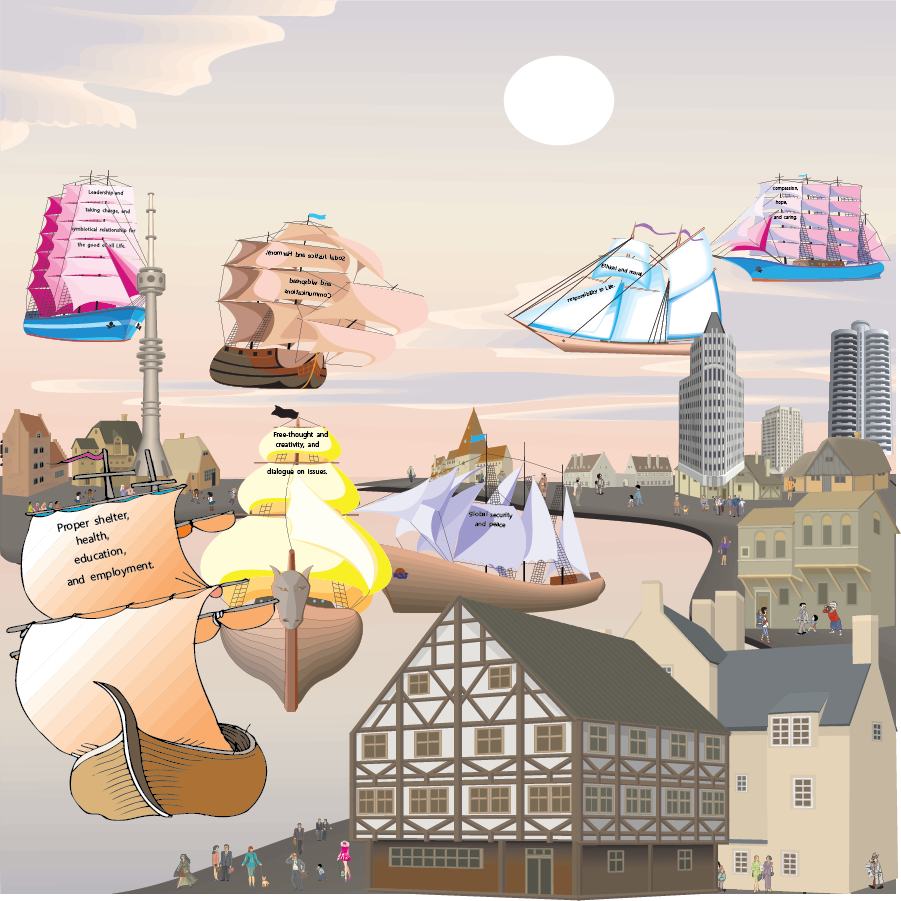
( see enlargement
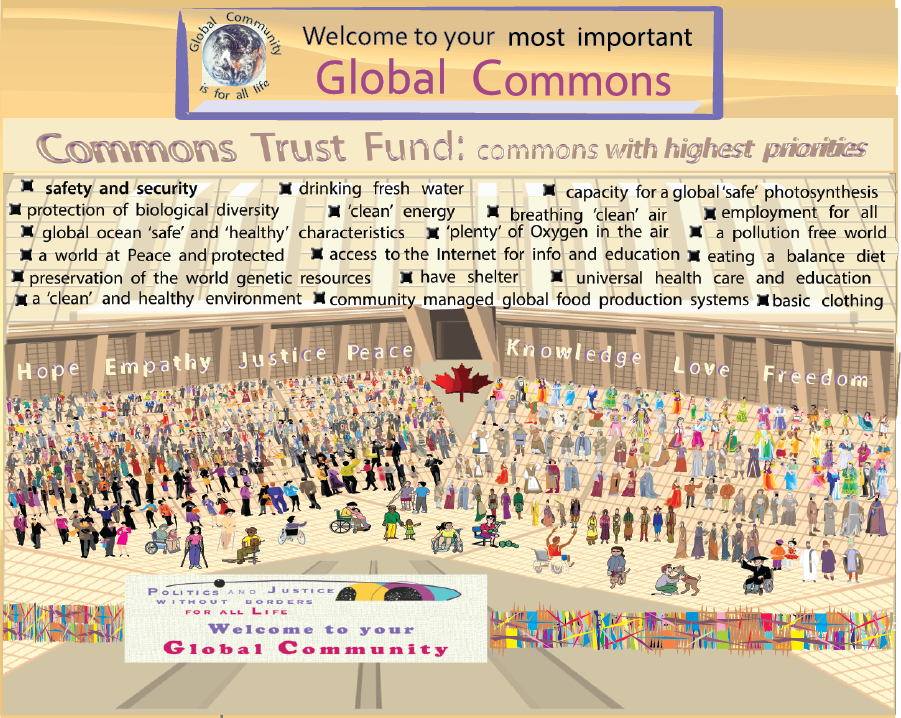
( see enlargement
Frames A9 and A10
This 21st century is very crucial for humanity as it will determine our survival or not as a species and, consequently, the survival of the next generations. Global Civilization is proposing to the world a way to achieve our survival. Critical steps to take now for our survival are:
a) the acceptance as inner truth and implementation of the Scale of Global Rights; and
b) to activate essential global ministries as the most important action of Global Civilization.
Building global communities require understanding of global problems this generation is facing. There are several major problems: conflicts and wars, no tolerance and compassion for one another, world overpopulation, human activities accelerating dangerously the amount of greenhouse gases in the air, as population increases the respect and value of a human life is in decline, insufficient protection and prevention for global health, scarcity of resources and drinking water, poverty, Fauna and Flora species disappearing at a fast rate, global warming and global climate change, global pollution reaching unhealthy peaks in the air, water and soils, deforestation, permanent lost of the Earth's genetic heritage, and the destruction of the global life-support systems and the eco-systems of the planet. We need to build global communities for all life on the planet. We need to build global communities that will manage themselves with the understanding of the above problems.
Earth has long been waiting for a truly global governing body based on universal values, human rights, global concepts and democracy. We might as well start this creating process now, there is no longer any reason to wait. But then Global Civilization is already here.
And yes, why not one for global politic? Global Civilization?
Global Civilization has now a Vision of the Earth in Year 2024 and a sense of direction.
Global Civilization embarks on a new path in history, the inevitability of global societies living, sharing, and creating symbiotical relationships interactively is, beyond doubt, that which we must confront. Our creativity today may influence tomorrow's socio-economic strategies and contribute to the evolution of human societies - an evolution directed towards a global partnership and cooperation with each other for survival.
To guide all Peoples toward survival, the Scale of Global Rights tells us what is the most important, and what is less important. We have to correct for the wrong ways taken by our society and governing bodies today. The Scale was designed on values that are a part of our history as human beings and on values that have kept us alive over time.
In any community, primordial human rights, the ecosystems of the Earth and the protection of the global life-support systems have to be given the highest priority and greatest importance, because that is where they sit on the Scale of Global Rights. The rights of the community to life, clean air, freshwater, a healthy environment, security, are the most important rights on the Scale. They are primordial human rights. The rights of property owners and businesses are much lower on the Scale.
During the past decades various changes have taken place in political, economic and social institutions. Economic reforms, changes in national policies, and global concerns have contributed to redefine the roles of these institutions for sustainable development.
In order to build a sustainable global community, each individual, each local community, and national governments of the world must initiate their commitment to Global Civilization.
Global Civilization was defined as a social, political and religious movement in the sense of having a broad organizational structure and an ideology aimed at governing. The environmental movement, within Global Civilization, expresses the concerns of groups of people regarding depletion of water, clean air, climate change aspects, degradation of land and other changes in ecosystems affecting traditional patterns of natural resources exploitation. Global Civilization has taken the role of helping these groups in protecting and managing the environment by coordinating their efforts.
Global Civilization is aware that religious beliefs, traditional customs and standards could burden the sustainability of all life on Earth. They could burden Earth society or any society forever, and holds individuals in a straitjacket. We cannot accept that. No one can! There are choices to be made, and we must make them. Cultures can develop and can go on developing. Even religious beliefs may evolve. We are living now, and we are able to create these changes. We are at least as bright, most certainly brighter, than the people who were living thousand of years ago.
Global Civilization promotes a culture based on respect and care for the Global Community of Life and is building democratic societies that are just, participatory, sustainable, and peaceful to:
a. Ensure that communities at all levels are guaranteed global rights and fundamental freedoms and provide everyone an opportunity to realize his or her full potential.
b. Promote social and economic justice, enabling all to achieve a secure and meaningful livelihood that is ecologically responsible.
c. Educate children to understand a broad panorama of human truths ~ all those universal needs and rights every one shares within Global Civilization.
d. Establish the Scale of Global Rights has an inner truth and the benchmark of the millennium in how we see all values.
e. Guarantee that the Earth Court of Justice will bring security, peace and Justice for all. We will no longer fear the unknown as Justice is for everyone and is everywhere, a universal constant.
Global Civilization will secure Earth's bounty and beauty for present and future generations as we:
a. Recognize that the freedom of action of each generation is qualified by the needs of future generations.The work of Global Civilization, the global civil society, and the determination of government worldwide, make it possible for everyone to comply with Global Law. Global Law includes legislation covering all aspects of human activities. And the GPA will enforce the law. And that is how we can stop the global warming of the planet and protect the global life-support systems, thus largely improving the quality of life of the next generations.
b. Transmit to future generations values, traditions, and institutions that support the long-term flourishing of Earth's human and ecological communities.
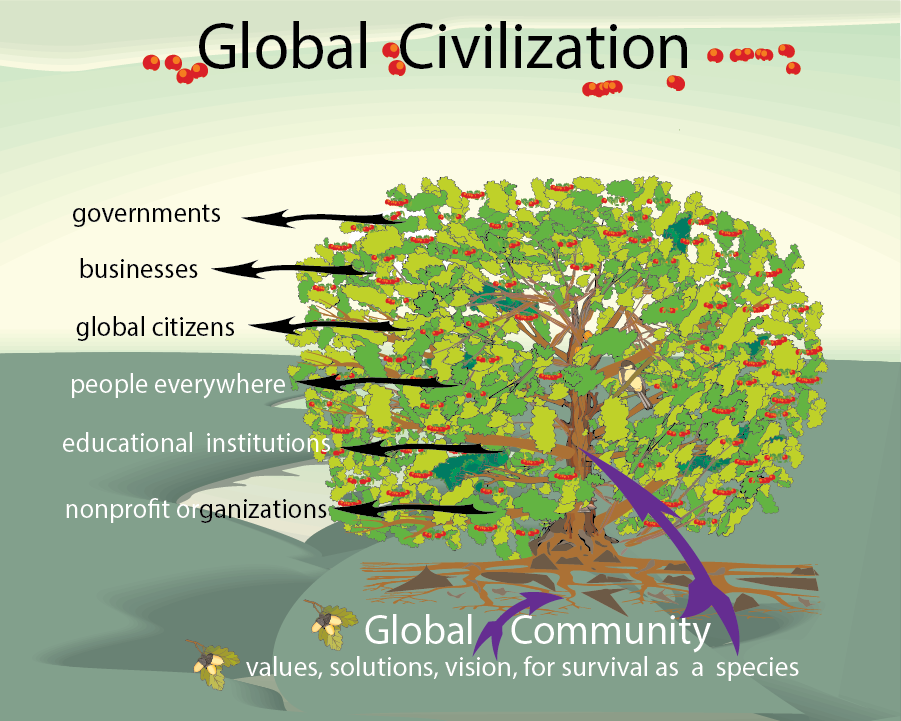
( see enlargement
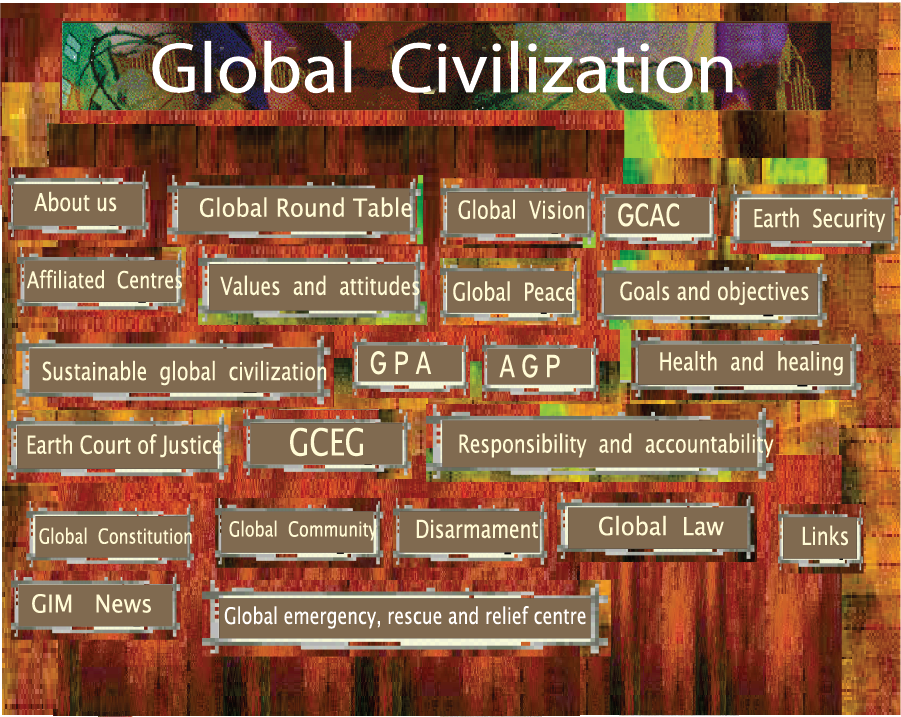
( see enlargement
Frames A11 and A12
Over the past decades we have shown that peace in the world and the survival and protection of all life on our planet go hand in hand. Asking for peace in the world means doing whatever is necessary to protect life on our planet. Protecting life implies bringing about the event of peace in the world. Let our time be a time remembered for a new respect for life, our determination to achieve sustainability, and our need for global justice and peace.
Our Global Peace Movement is about the courage to live a life in a harmonious peace order and showing by example, thus preventing poverty, wars, terror and violence. We need to educate the coming generations with good principles, being compassionate, social harmony and global sustainability being some of them.
Learning to empathise with other people, including those who may be very different from us, is another good principle. Empathy is at the root of kindness, compassion, understanding and respect. Those are qualities that we all appreciate being shown, whoever we are, whatever we think and wherever we come from. And although it is not possible to know what it really feels like to be a different person or live in different circumstances and have different life experiences, it is not difficult for most of us to imagine what would cause us suffering and to try to avoid causing suffering to others.
Global Community ethics are about how we treat others and a commitment to respect every person humanely and with dignity. For this process to work, global citizens learn to forgive, be patient and compassionate, promote acceptance, open theirs hearts to one another, and practice a culture of solidarity and cooperation. Let go narrow differences for the greater good of humanity and future generations.
It is Global Community challenge to develop ethics, moral directives, that can be acceptable to all Peoples for the survival of all life on our planet, and that will require sacrifices from us all. Let us remember over and over again that our primary goal and the most important principle on the Scale of Global Rights is the survival of all Life on Earth.
Global Community faith is helping, along with the various communities of faith, to formulate their very specific ethics about the meaning of life and death, the enduring of suffering and the forgiveness of guilt, about selfless sacrifice and the necessity of renunciation, and about compassion and joy.
One of the greatest causes of conflict in history has been the conflicting views of different religions. And at the same time it is religion that has most effectively fostered humanitarian actions. Allegiance to a faith dealing with the mysteries of life: Why are we here? Is there a future life? Is there a God? often provides meaning and incentives for a virtuous life. Every faith is unanimous of saying that every individual should be treated with the same respect and dignity we all seek for ourselves.
All religions are required to conduct positive actions for peace, and to re-examine their scriptures, precepts, practices, ethical and moral values in light of global ecological concerns. It is very important that every person on Earth accept of being part of the process in protecting the global life-support systems. The ecological crisis is as much about saving children as it is about saving other lifeforms on the planet. We are also asking for specific statements on environmental conservation. And we want positive and meaningful action in view of those statements.
Cultural and religious differences cannot be a reason or an excuse or a pretext for not respecting human rights. Diversity enriches us if it respects the dignity of each individual, and if it takes account of human rights.
Wherever there are people there will be conflicts, and ethics can help to resolve conflicts. Global Community proposes that such conflicts be resolved without violence and within a framework of justice. People must commit themselves to the most nonviolent, peaceful solutions possible. This is the pathway to global peace.
To manage Earth is very important. We have the responsibility of managing Earth. Everyone shares responsibility for the present and future well-being of life within Global Community.
We will reinstate the respect for Earth and work together to keep Earth healthy, productive and hospitable for all people and living things. We have joined forces to bring forth a sustainable global society embracing universal values related to global rights, economic and social justice, respect of nature, peace, responsibility to one another, and the protection and management of the Earth.
Global Community will help businesses to be part of the solution to the challenges of globalisation. In this way, the private sector in partnership with the civil society can help realize a vision: allowing a global equitable and peaceful development and a more stable and inclusive global economy.
The lives of all lifeforms and plants on our planet deserve protection, preservation, and care. Global Community disapproves of the limitless exploitation of the natural foundations of life, the relentless destruction of the biosphere, and the militarization of the space within and above the Earth's atmosphere. Global citizens must live in harmony with nature on and above the Earth's surface.
Global Community has begun to establish symbiotical relationships between communities and nations all over the world. The fundamental criteria is that a relationship is created for the good of all groups participating in the relationship and for the good of humanity, all Life on Earth. The relationship allows a global equitable and peaceful development and a more stable and inclusive global economy.
Conservation, restoration, and management of the Earth resources is about asking ourselves the question of "Who owns the Earth?" The large gap between rich and poor is connected to ownership and control of the planet's land and of all other Earth natural resources. We, global citizens, must now direct the wealth of the world towards the building of local-to-global economic democracies in order to meet the needs for food, shelter, universal healthcare, education, and employment for all. Global Community has proposed a democracy for the people based on the fact that land, the air, water, oil, minerals, and all other natural resources rightly belong to Global Community along with the local communities where those resources are found. The Earth is the birthright of all Life.
The world is too crowded and too small nowadays! And weapons too lethal! So security cannot be achieved through the military. The only job the military should be asked to do today is to protect the global life-support systems. These systems have the highest priority on the Scale of Global Rights and are certainly more important than any of the other rights on the Scale including security. Simply because without life there is no other right possible. Without Oxygen there is no life! Without clean water there is no life! So protect life on Earth at all costs. Wars are the biggest threat to life and the ecosystem of the planet.
The production and trade in arms should be listed as a criminal act against humanity; this global ministry, the Ministry of Global Security and Peace, shall introduce a Convention on the curtailment of the arms trade, a provision for a mandatory Arms Register and the prohibition of the financing or subsidy of arms exports by governments.
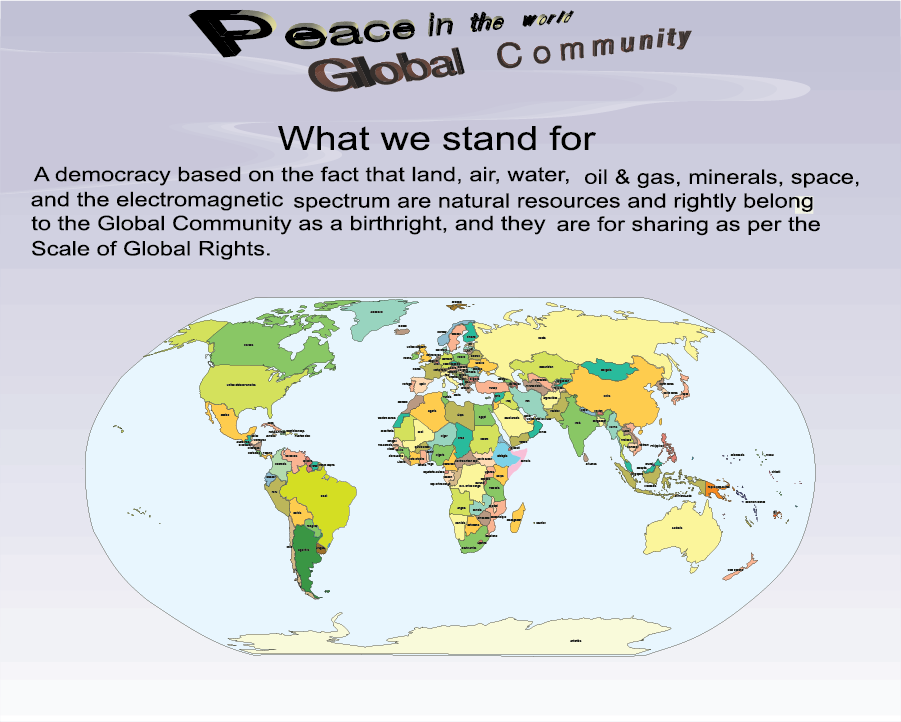
( see enlargement

( see enlargement
Frames A13 and A14
Our planet is populated with living beings consisting of millions of different life forms interacting with each other to survive, thus forming an intricate web of life in different ecosystems on the planet. The interaction and interdependence between life forms are the driving force that creates and maintains an ecological - environmental equilibrium that has sustained life on Earth for millions of years enabling it to evolve, flourish and diversify. Global Community values Earth’s diversity in all its forms, the non-human as well as the human.
On Earth’s surface exists a diversity of arctic, temperate and tropical ecosystems with many different varieties of plants, animals, and human beings, all of which are dependent on soils, waters and local climates. Thus biodiversity, the diversity of organisms, depends on maintenance of ecodiversity, the diversity of ecosystems. Cultural diversity – which in effect is a form of biodiversity – is the historical result of humans fitting their activities, thoughts and language to specific geographic ecosystems. Therefore, whatever degrades and destroys ecosystems is both a biological and a cultural source. Global Community values Earth’s diversity in all its forms, the non-human as well as the human.
Today, we describe these many societal benefits from the natural world as ecosystem services. These services are very important to survival, our enjoyment of a decent quality of life, and contributes to the wellbeing of humanity.
Coastal, forest, grassland, freshwater, global ocean and agricultural ecosystems provide essential goods and services such as climate control, nutrient recycling, production of food, provision of freshwater, storage of atmospheric CO2, maintenance of biodiversity, and provision of tourism opportunities. Freshwater ecosystems include species found in lakes, rivers, and wetlands.
The Earth's ecological problems stem largely from our collective failure to share. It is now increasingly evident that only by sharing the world's natural resources more equitably and sustainably will we be able to address both the ecological and social crisis we face as a Global Community. All major habitat types across the planet are substantially degraded with alarming implications for their continued capacity to support human well-being into the long-term future.
So, how do we go about adapting our behaviours to manage in a sustainable way the many environmental commons upon which we rely but have consistently overlooked in decision-making at the very least since the outset of the Industrial Revolution?
A first priority is the protection and care of the environment and natural resources, including creatures large and small. We should be encouraged to think and act as Earth managers and support an Earth care initiative. At this moment global warming is a major problem. We should seek to reduce its causes, and we can further these goals by thinking and acting as Earth managers and by joining in the observance of one great global holiday: Life Day Celebration on May 26 of each year.
Our world is facing crises of freshwater, food, deforestation, ocean health, and destruction of the global life-support systems. We need leadership in the protection of all our natural resources, in peril because of what we do and what that does to our planet. We are facing a fresh water crisis. We are facing a food crisis. We are facing a crisis over deforestation. And we are facing crises in our oceans. While carbon emissions from fossil fuels pollute the air, land and our oceans, we are facing the climate change crisis. Now is the time to press for leadership.
Those who fight to protect life on Earth for this generation and the next ones are the defenders of the environment and the global life-support systems. They know who the beasts are, the planarchists, and how they destroy the living on our planet. They have rallied together all over the world to protect our home, Earth. We know it all! We know how everything works. And we will do whatever it takes to protect life on Earth. "We the Peoples", Global Community , the Federation of Global Governments, are the Earth revolutionaries, and we will protect life on Earth at all costs.
We need ways of organizing ourselves to help us live in a world with less energy and to grow strong caring communities in which we get more of our human satisfaction from caring relationships and less from material goods. We need to reclaim the ideal of being a democratic middle-class people without extremes of wealth and poverty. We need to recover a deep sense of community that has disappeared from many of our lives. This means letting go a sense of ourselves as consumption machines.
The lives of all lifeforms and plants on our planet deserve protection, preservation, and care. Global Community disapproves of the limitless exploitation of the natural foundations of life, the relentless destruction of the biosphere, and the militarization of the space within and above the Earth's atmosphere. Global citizens must live in harmony with nature on and above the Earth's surface.
But all these crises are due to human activities, our ways of doing business and trade, and to our ways of consuming resources, and involved well known international organizations and nations such as:* G7 nations,Most dont have ethics. If they do they dont follow them.
* World Trade Organization (WTO),
* Free Trade Agreement (FTA),
* North American Free Trade Agreement (NAFTA),
* Free Trade Area of the Americas (FTAA),
* World Bank,
* Free trade between Canada and the EU,
* International Monetary Fund (IMF), and the
* military and war industry.
The problem is the system they have created. It has become clear that this culture of waste, mismanagement and corruption cannot reform itself.
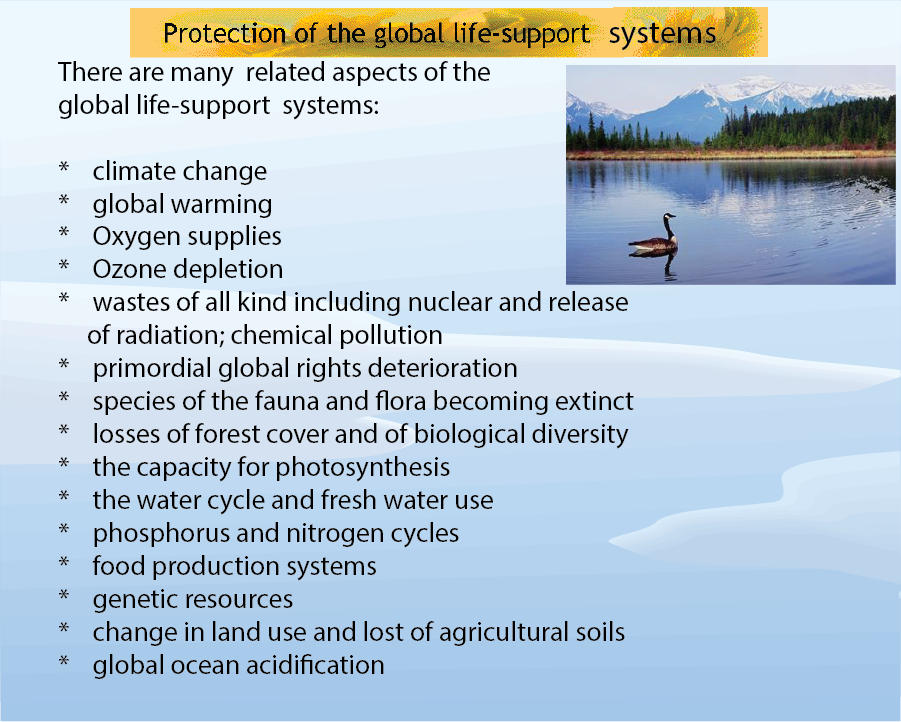
( see enlargement
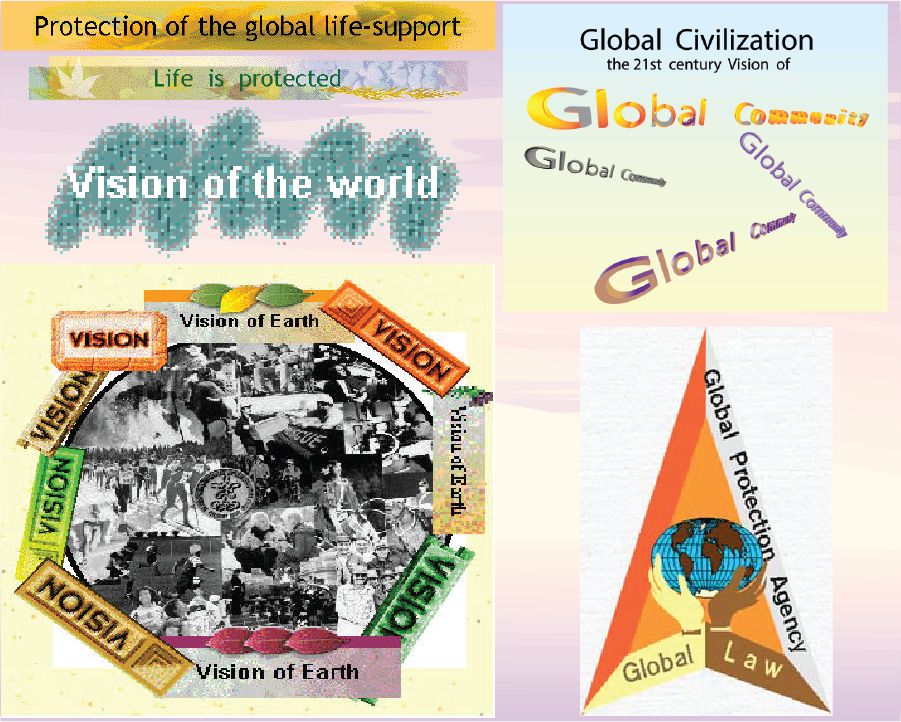
( see enlargement
Frame A15
Global Community offers both a short term solution and a long term solution to the people of all nations. Both solutions have been integrated into the Scale of Global Rights, itself a necessary first step which must be approved by all of us.
The Scale of Global Rights contains six (6) sections. Section 1 has more importance than all other sections below, and so on.
Concerning sections 1, 2, and 3, it shall be the Global Community highest priority to guarantee these rights to their respective Member Nations and to have proper legislation and implement and enforce global law as it applies and as shown in the Global Constitution.
Section 1. Global [ Ecological, environmental, protection of life-support systems ] rights
Section 2. Primordial human rights
Section 3. The Global [ Ecological, environmental, protection of life-support systems ] rights, and the primordial human rights of future generations.
- safety and security
- have shelter
- 'clean' energy
- a 'clean' and healthy environment
- drink fresh water
- breath clean air
- eat a balance diet
- basic clothing
- universal health care and education, and
- employment for all.
Primordial human rights are those human rights that individuals have by virtue of their very existence as human beings. They are in a separate categorie and distinct than ecological rights, the right of the greatest number of people, economic rights, social rights, cultural rights and religious rights. Ecological and primordial human rights are the only rights that have existed unchanged throughout the evolutionary origin of our species.
Any major change would have threatened our very existence. All other human rights listed here are rights created by human beings and can be changed depending of new circumstances; they are not stagnant but are rather flexible and adaptive, and they can evolve. Ecological and primordial human rights of this generation and of future generations are therefore much more important than any other human rights existing now and in the future.
As a first step to getting help, all nations can and should approve those first three sections on the Scale. The approval would supersede a nation political and physical border anywhere in the world. The Global Protection Agency (GPA) would have the approval from all member nations to give immediate help. Somewhat like an emergency unit but at the global level. That is what those first three sections mean. An efficient and immediate emergency response to help.
First, participating member nations need to give their approval to the GPA.
The GPA is a global organization much like the World Trade Organization (WTO) for trade between nations, or the World Health Organization (WHO) for health. The GPA offers an efficient emergency response to help.
The GPA is a short term solution, an immediate response to help. There are also long term solutions. As with the short term solution, the most significant long term solution is also related to the Scale of Global Rights.
Since year 1985 the Global Community has organized the Global Dialogue to probe the Peoples of the world, people from all nations, as to what it will take to make living on Earth sustainable, now and for the next generations. Results were published in our Proceedings.
Global Rights year one is a new impetus of the Global Community to educate everyone about the need for a change in thinking and of doing things amongst all nations. We need to realize what is a priority, what is the most important, and what is the least important for our survival. We need to make hard choices. We need a clear vision. We need a common vision. And we must all change! There are many important aspects of our lives we can no longer do, or should never do anymore. They are destructive. Humanity and all life can no longer afford activities that destroy life and the global environment. And there are other activities we must do, certainly thousands of them, to assure the survival of life on Earth. In view of the planetary state of emergency we all must change, we must do things differently to give life on Earth a better survival chance.
And this is what Global Rights year one is about: to establish global fundamentals and a clear vision to follow.
Perhaps the Scale of Global Rights represents the strongest pillar of our vision.
In 1985, the Scale of Human and Earth Rights was first proposed as a replacement to the Universal Declaration of Human Rights. After several decades of research and development, many global dialogues, we still find the Scale as the best solution to global problems. The Scale has now been titled the Scale of Global Rights.
Today, we are presenting once more the Scale as the best educating tool to bring about the change the people of the world need to achieve for their own survival.
Now the Scale of Global Rights is a long term solution and is also a part of the Global Movement to Help of Global Community. In itself the Scale was designed to help all life on Earth. What would be preferable is that nations unite amongst themselves to help. Over time, we have seen the creation of the United Nations, the European Union, the South American Community of Nations, and the North American Free Trade Agreement. Except for the UN, these organizations are mainly concerned with trade and economics. Global Community offers a more meaningful union in the form of nine or more Global Governments. For instance the South American Community of Nations can be a Global Government by simply accepting the Global Constitution as a way of dealing between member nations. A Global Government is concerned not only with economics and trade, but also with the environment, health, agriculture, energy, food, social, cultural and many other essential aspects.
The Federation of Global Governments would be the place of meeting between Global Governments. The very first step of the Federation, and maybe the only one, would be the approval of essential services amongst the participating member nations. Global Community has researched and developed such services and listed them here. All of them are already in operation on a small scale.
Global Community offers a new global order with a vision of Hope and Love away from despair and social chaos. This new global order will be better, safer, and more realistic after replacing the 1948 Universal Declaration of Human Rights by the Scale of Global Rights.
To determine rights requires an understanding of needs and reponsibilities and their importance. The Scale shows social values in order of importance and so will help us understand clearly the rights of a community, its citizens, including corporate citizens. So now Global Community ethics includes a process based on the Scale of Global Rights.
Human morality, though sophisticated and complex relative to other lifeforms, is essentially a natural phenomenon that evolved to restrict excessive individualism of the 1%, including their human rights, that could undermine a group's cohesion and thereby reducing all life's survival on our planet.
After making the proper adjustment to ways of doing business in the world, morality can then be defined as an accumulation of interrelated behaviors that cultivate and regulate complex interactions within social groups. These behaviors includes empathy, reciprocity, altruism, cooperation, a sense of fairness, symbiotical relationships, and have been included directly into the corporate citizen global ethics.
Earth Environmental Governance can only be achieved successfully within the larger context of Sustainable Developent and Earth Management. All aspects are inter-related and affect one another. A healthy environment is essential to long term prosperity and well-being, and citizens in the Global Community demand a high level of ecological protection. This is the 'raison d'etre' of the Scale of Human and Earth Rights. Primordial human rights are those human rights that individuals have by virtue of their very existence as human beings: to live, eat, drink fresh water, breath clean air, and have shelter. These rights are separate categories than ecological rights, the right of the greatest number of people, economic rights, social rights, cultural rights and religious rights. Ecological and primordial human rights are the only rights that have existed unchanged throughout the evolutionary origin of our species. Any major change would have threatened our very existence.
All other human rights listed here are rights created by human beings and can be changed depending of new circumstances; they are not stagnant but are rather flexible and adaptive, and they can evolve. Ecological and primordial human rights of this generation and of future generations are therefore much more important than any other human rights existing now and in the future. In this way the Scale of Global Rights gives us a sense of direction for future planning and managing of the Earth. Earth management is now well defined and becomes a goal to achieve. We no longer waste energy and resources in things that are absolutely unimportant.
In this way the Scale of Global Rights gives us a sense of direction for future planning and managing of the Earth. Earth management is now well defined and becomes a goal to achieve. We no longer waste energy and resources in things that are absolutely unimportant.
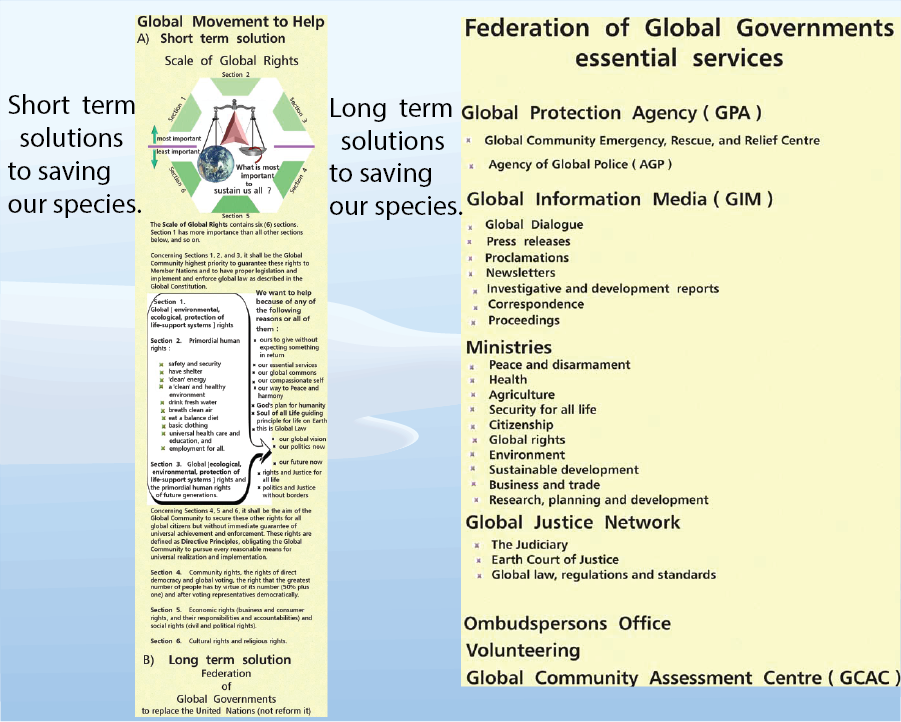
( see enlargement
Frames A16 to A20
We, citizens of the Global Community, hereby resolve to establish a federation of all nations, and to govern in accordance with Global Parliament Constitution. Reflecting the will of the Global Community citizens and all Nations to build a common future, this Constitution establishes Global Parliament, on which Member Nations confer competences to attain objectives they have in common. Global Parliament shall coordinate the policies by which Member Nations aim to achieve these objectives.
Global Community offers a more meaningful union in the form of nine (9) or more Global Governments. For instance the South American Community of Nations can be a Global Government by simply accepting Global Parliament's Constitution as a way of dealing between member nations. A Global Government is concerned not only with economics and trade, but also with the environment, health, agriculture, education, energy, food, social, cultural and many other essential aspects.
The Federation of Global Governments is the place of meeting between Global Governments.
The very first step of Global Parliament, and maybe the only one for several decades ahead of us, would be the approval of essential services amongst the participating member nations. Global Community has researched and developed such services and listed them here. All of them are already in operation on a small scale. We want each Global Government to take a larger share of responsibility of the specific region where it operates, and be more accountable to the people of that region. And we want a Global Government to be made of wealthy nations as well as nations in need of help. Be compassionate. Each Global Government is obliged to offer Essential Services to the people of its member nations.
Over the past several decades, Global Community along with Global Parliament, have promoted a just and fair global government. The United Nations (UN) organization does not offer such global service to all Peoples. It is not a government. It is not a democratic institution. It has no power to legislate, protect and offer essential services. There is no Justice possible coming from the UN. The Five Permanents Members are the only rule of law. There are themselves subsidized by corporate rulers, lobbyists with vested interests in keeping things the way they are now. There are no change in sight because they cannot change themselves. We must let go the UN. It is a 20th Century WWII organization that can truly make things work for only 5% of the world nations. Staying with the UN certainly means there will not be a 22nd Century to live for most people on Earth. The world needs a 21st Century organization able to manage Earth and bring hope in every home.
A working Constitution is the only way for us all to guarantee essential services, Justice, and protection to every home. Global Parliament is not a World Government or Earth Government. No! It is the Federation of Global Governments. Global Parliament and its Constitution were researched and developed from fundamental principles as opposed to kitchen recipe types of Constitution that follow a set of instructions for a world parliament of some kind. Some of those principles we developed are the Global Community and the Scale of Global Rights. That is what differentiates most our proposal from others. The Federation and its Global Parliament operate as per those principles. The definition of the Global Community concept is truly the 21st century "philosophy of life" framework, some called it the religion of the third millennium, others called it the politics of the future generations now.
Global Parliament is the only possible and practical solution to our world. We know how everything work, and we know what to do to make it work for us all. We do volunteer work for humanity. We do 'soft activism' work. Global Parliament Constitution shows us how to operate our organization. We follow Global Law as shown in the Constitution. All those who do volunteer work for us must become familliar with it and become 'global citizens'. You are required to read about the Criteria of the Global Community Citizenship. Once you are sure you understand the Criteria, then you are required to live a life as per the Criteria. You do not need to let go the citizenship you already have. No! You can still be a citizen of any nation on Earth. But you are a better human being as you belong also to the Global Community, and you have now higher values to live a life, to sustain yourself and all life on the planet.
We do not relate in any way with the United Nations. We are here to replace it. For several decades Global Community has tried very hard to reform the United Nations. It has become clear that the United Nations promotes a culture of waste, mismanagement and corruption, and that it cannot reform itself. Today, the only logical, most equitable and sustainable alternative, is to replace it with Global Parliament.
Global Parliament primary goal and focus include only a few essential aspects. Global Parliament Constitution itself gives the highest priority to the following essential aspects of life within civil society:
* essential servicesto manage the needs of the Peoples of Member States.
* the Judiciary
* the Global Protection Agency (GPA)
* Global Ministries
These four aspects are a part of the Global Movement to Help of the Global Community. From now on we serve the people of all nations, all life on Earth. Each Global Government is made more responsible and accountable to the people of member nations within the region where it operates. Essential services to the people of each member nation are now the most important global rights on the Scale of Global Rights and are protected by the Global Protection Agency (GPA) of each member nation.
This Global Movement to Help offers Essential Services to serve the people of all nations, all life on Earth. As a first step to getting help, all nations can and should approve the first three sections on the Scale of Global Rights. The approval would supersede the political and physical borders of participating member nations. The approval would mean politics and justice without borders only concerning those three sections, i.e essential services. The Global Protection Agency (GPA) would have the approval from all member nations to give immediate help, bypassing normal government protocols. Somewhat like an emergency unit but at the global level. That is what those first three sections on the Scale of Global Rights mean. They represent an efficient and immediate emergency response to help.
First, participating member nations need to give their approval to the GPA. The GPA is a global organization much like the World Trade Organization (WTO) for trade between nations, the World Health Organization (WHO) for health, or the European Union, North American Free Trade Agreement (NAFTA), South American Community of Nations (SACON) for trade and economics. The GPA offers an efficient emergency response to help. The GPA is a short term solution, an immediate and efficient response to help. There are also long term solutions. As with the short term solution, the most significant long term solution is also related to the Scale of Global Rights. The Scale was entrenched is Global Parliament Constitution and is thus the fundamental guide to Global Law. Now the Scale of Global Rights is a long term solution and is also a part of the Global Movement to Help of the Global Community. The Scale was designed to help all life on Earth.
What would be preferable is that nations unite amongst themselves to help. And that is our reason for proposing the formation of Global Parliament.
Accountable government is what humanity needs. Global Community deserves nothing less. Global Parliament is what we offer. Let us build a Global Commons Trust. Let it be administered by the Global Protection Agency (GPA) of Global Community.
A working Global Parliament Constitution is the only way for us all to guarantee essential services, Justice, and protection to every home. Global Parliament is not a World Government or Earth Government. No! It is the Federation of Global Governments. Global Parliament and its Constitution were researched and developed from fundamental principles as opposed to kitchen recipe types of Constitution that follow a set of instructions for a world parliament of some kind. Or as opposed to using the old USA Constitution with its military overtones to invading the world and lobbyists base democracy.
Some of those principles we developed are the Global Community and the Scale of Global Rights. That is what differentiates most our proposal from others. The Federation and its Global Parliament operate as per those principles. The definition of Global Community concept is truly the 21st century "philosophy of life" framework, some called it the religion of the third millennium, others called it the politics of the future generations now.
Global Parliament shall:
1. jointly with the Executive Council, enact legislation, and exercise the budgetary function, as well as functions of political control and consultation as laid down in the Constitution. Global Parliament shall elect the President of Earth Government.
2. be elected by direct universal suffrage of all the Global Community citizens in free and secret ballot for a term of five years. Representation of Global Community citizens shall be of one Elected Representative per million people. Sufficiently in advance of the Parliamentary elections, the Global Governments Federation shall adopt by unanimity, on the basis of a proposal from Global Parliament and with its consent, a decision establishing the composition of Global Parliament, respecting the principles set out above.
3. elect its President and its officers from among its members.
Composition of Global Parliament
Global Parliament shall be composed of four (4) bodies, designated as follows:
1. the House of Elected Representatives, to represent the Global Community directly and equally;
2. The Federation of Global Governments, to represent the nations of the world;
3. House of Advisers with particular functions to represent the highest good and best interests of humanity as a whole; and
4. the Executive Council
Global Parliament
The House of Elected Representatives, the House of Advisers, the Executive Council, and the Federation of Global Governments together form Global Parliament. The Peoples of Global Community elect, nominate or appoint their representatives to Global Parliament.
Federation of Global Governments
The Federation of Global Governments represents the nations of the world. Candidates to the Federation are elected or appointed by Member Nations. The Federation is the place of meeting between Global Governments. We want each Global Government to take a larger share of responsibility of the specific region where it operates, and be more accountable to the people of that region. And we want a Global Government to be made of wealthy nations as well as nations in need of help. Be compassionate. Each Global Government is obliged to offer Essential Services to the people of its member nations.
House of Elected Representatives
The House of Elected Representatives represents Global Community directly and equally. Candidates to the House of Elected Representatives are elected democratically. Representatives shall be elected by direct universal suffrage of all Global Community citizens in free and secret ballot for a term of five years. Representation of the Global Community citizens shall be of one Elected Representative per million people.
House of Advisers
Candidates to the House of Advisers are nominated by teachers, students, or professional organizations. The House of Advisers goal is to represent the highest good and best interests of humanity as a whole.
Executive Council
Members of the Earth Executive Council shall consist of a representative of each Member Nation at ministerial level.
Global Parliament Constitution
The peoples of all Nations, in creating an ever closer Global Parliament among them, are resolved to share a peaceful future based on common values. Conscious of its spiritual and moral heritage, Global Parliament is founded on the indivisible, universal values of human dignity, freedom, equality and solidarity; it is based on the principles of democracy and the rule of law. It places the individual at the heart of its activities, by establishing the Global Community citizenship of Global Parliament and by creating an era of freedom, security and justice.
Global Parliament contributes to the preservation and to the development of these common values while respecting the diversity of the cultures and traditions of the peoples of all Nations as well as the national identities of Member Nations and the organisation of their public authorities at national, regional and local levels; it seeks to promote balanced and sustainable development and ensures free movement of persons, goods, services and capital, and the freedom of establishment. To this end, it is necessary to strengthen the protection of fundamental rights in the light of changes in society, social progress and scientific and technological developments by making those rights more visible in this Constitution.
Global Parliament's Constitution reaffirms, with due regard for the powers and tasks of Global Parliament and the principle of subsidiarity, the rights as they result, in particular, from the constitutional traditions and international obligations common to Member Nations, the Scale of Social Values, or Scale of Global Rights, adopted by Global Parliament and by the Global Council of all Nations and the case law of the Earth Court of Justice of Global Parliament and of the Global Court of Global Rights. Enjoyment of these rights entails responsibilities and duties with regard to other persons, to the human community and to future generations. Global Parliament therefore recognises the rights, freedoms and principles set out hereafter.
We the Peoples of the Global Community are reaffirming faith in the fundamental human rights, in the dignity and worth of the human person, in the equal rights of men and women and of nations large and smalll. We the Peoples implies every individual on Earth. Earth management and good governance is now a priority and a duty of every responsible person on Earth. The Global Community has taken action by calling the Divine Will into our lives and following its guidance. Divine Will is now a part of the Soul of Humanity to be used for the higher purpose of good and Life's evolution. We will learn to serve humanity and radiate the Will of God to others. We will establish conditions under which justice and respect for the obligations arising from treaties and other sources of international law can be maintained, and we promote social progress and better standards of life in larger freedom.
The spiritual belief, universal values, principles and aspirations of the Global Community will be attained by:
- practicing tolerance and living together in peace and harmony with one another as neighbours,
- promoting the economic and social advancement of all peoples,
- maintaining peace and security in the world by using negotiations and peaceful means,
- finding unity in diversity with all Life,
- establishing the respect for the life-support system of the planet,
- keeping Earth healthy, productive and hospitable for all people and living things, and
- applying the principle that when there is a need to find a solution to a problem or a concern, a sound solution would be to choose a measure or conduct an action, if possible, which causes reversible damage as opposed to a measure or an action causing an irreversible loss.
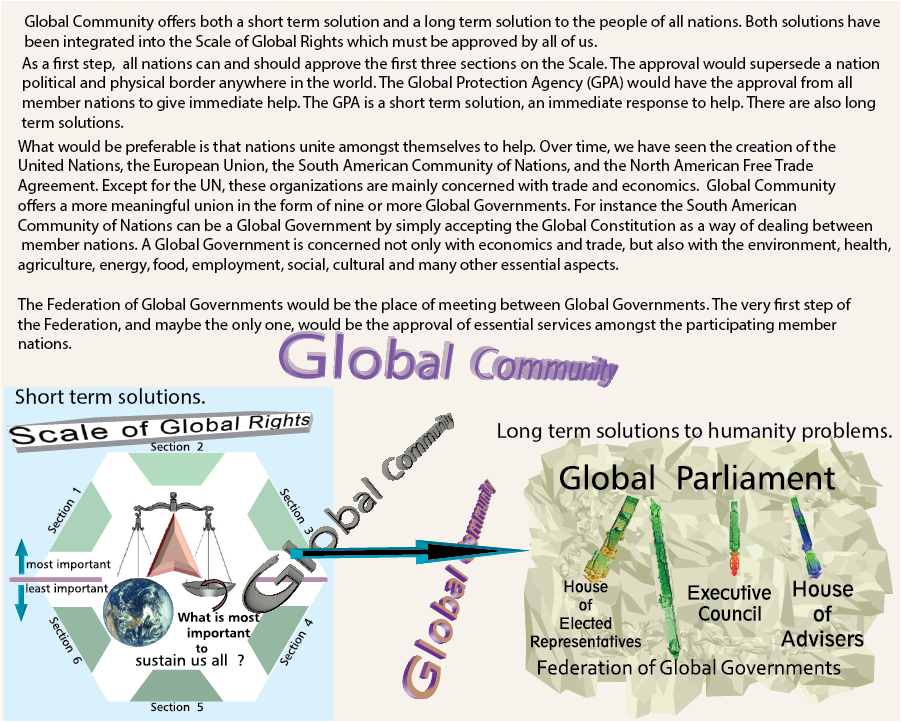
( see enlargement
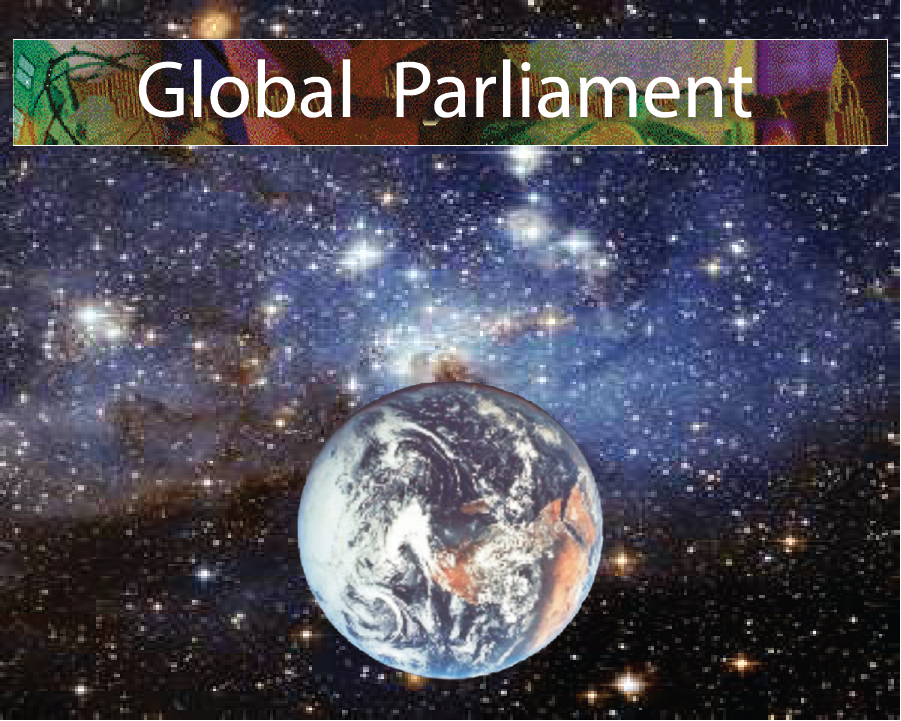
( see enlargement
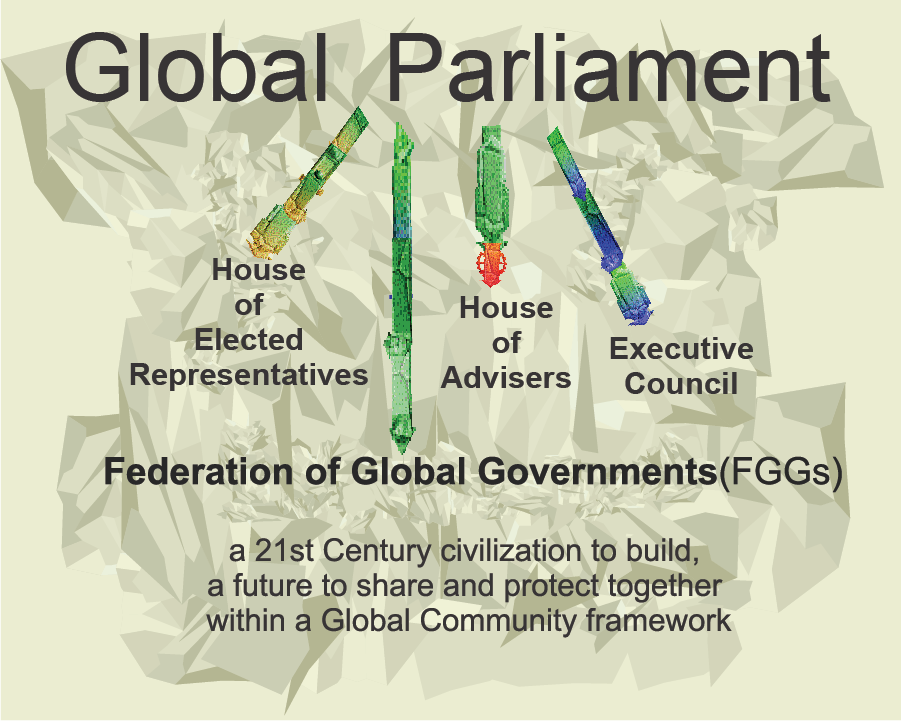
( see enlargement
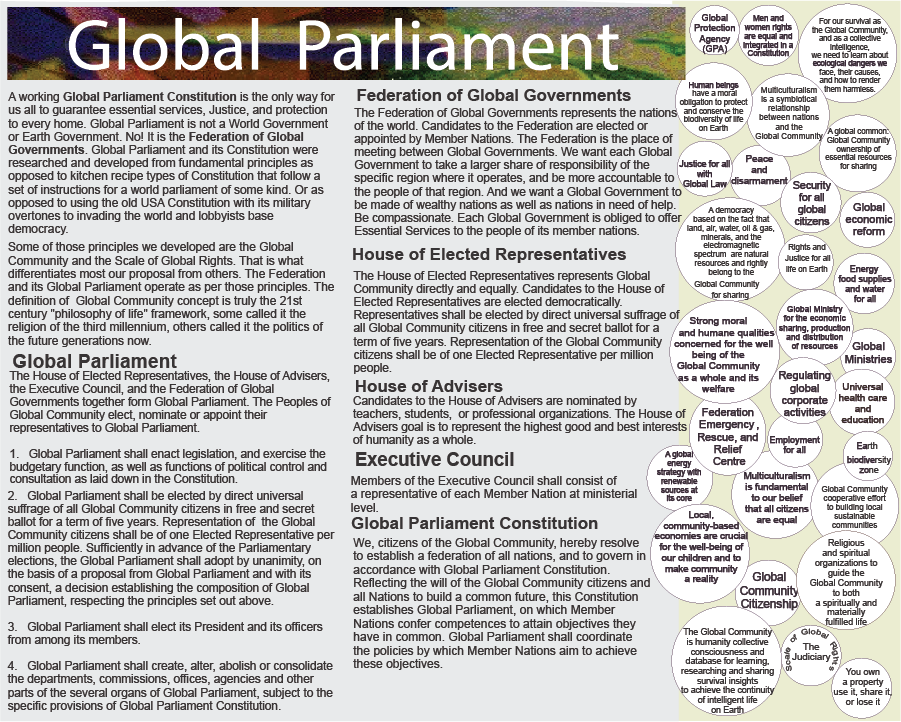
( see enlargement
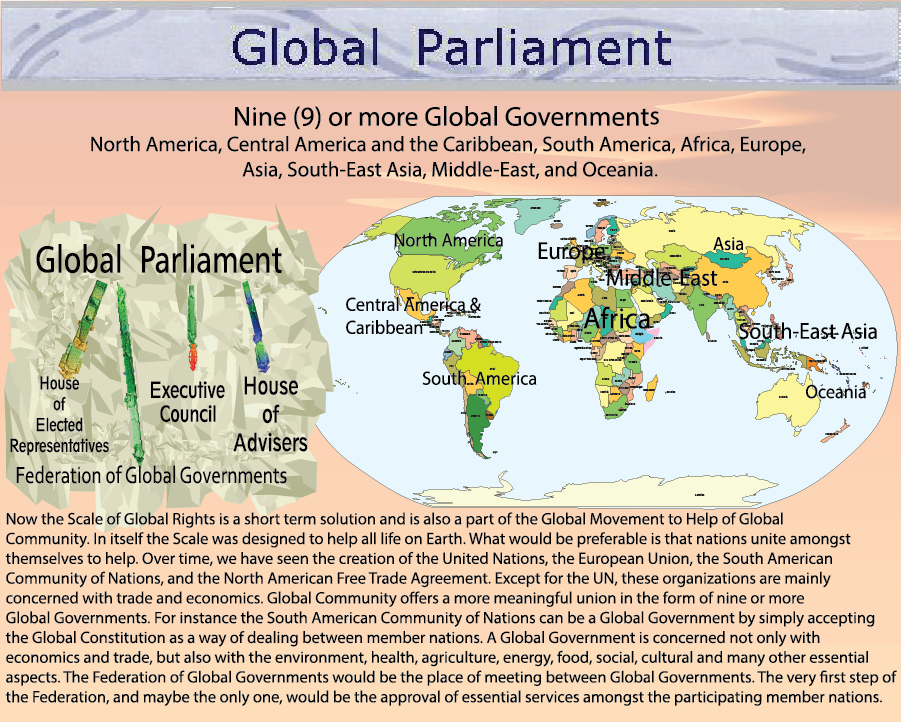
( see enlargement
Frame A21
Global Community is proposing ethics to live by for life's survival on our planet. Humanity urgently wants social and ecological reforms, as well as a spiritual renewal to add trust, meaning, standards and practical guidelines to this new quest for survival. Global citizens want a spiritual home to do good and avoid evil in all its forms. Global ethics are intended to clarify what this means.
Global Community ethics have established that the greatest happiness of the greatest number of people is a measure of right and wrong. What matters is the combined positive effect of everyone and not only of any one person (or the wealthy 1% in our society). Global Community ethics are meant to save humanity, all lifeforms on Earth, from extinction, and includes a process based on the Scale of Global Rights which describes social values in order of importance to help us understand clearly the rights of a community and its citizens. Global citizens have a binding responsibility for the welfare of all humanity and care for all life on Earth.
Not sure ethics are the answer to all humanity's problems! But ehtics will certainly show the way to the survival of life in all its forms on our planet.
The ethics proposed here provide no direct solution for all the extensive problems of humanity. The ethics are giving humanity the moral foundation for a better individual and community. Global Community offers a new global order with a vision of Hope and Love away from despair and social chaos. Global Community ethics offer fundamental moral behaviors and irrevocable standards. We need not be religious to make this vision ours. This vision is for all human beings regardless of their social origin, language, culture, sex, skin color or religion. Global Community vision creates new hopes, standards, ideals and goals for everyone to embrace freely, and live a life without fear. Global Community faith is about realizing this new global order will be better, safer, and more realistic after replacing the 1948 Universal Declaration of Human Rights by the Scale of Global Rights. To determine rights requires an understanding of needs and reponsibilities and their importance. The Scale shows social values in order of importance and so will help us understand clearly the rights of a community and its citizens. So now Global Community ethics includes a process based on the Scale of Global Rights. Global Community ethical grounds are practical, real, and applicable for all women and men of good will, religious and non-religious.
Global Community ethics offer the possibility of a better individual and community, a global order with fairness and Justice, and a world with Hope and Love. A world where everything make sense in all areas of life, for families and communities, for races, nations and all religions.
In the developed countries, a distinction must be made between necessary and limitless consumption, between socially beneficial and non-beneficial uses of property, between justified and unjustified uses of natural resources, and between a profit-only and a socially beneficial and ecologically oriented market economy.
Economic and political power must be used as a service to humanity instead of misusing it in ruthless battles for domination. Global Community faith can help to develop a spirit of compassion with those who suffer, with special care for the children, the aged, the poor, the disabled, and the refugees.
In society, the proper course of action is one that maximizes a positive effect, such as "happiness", "welfare", "humanity survival", or the ability to live according to personal preferences. Today, it is the greatest happiness of the greatest number that is the measure of right and wrong. What matters is the combined positive effect of everyone and not only of any one person. Developing ethics that would save humanity from extinction will encounter numerous criticisms from individuals whose basic human rights were violated. But that is to be expected! And there is no other way! Global Community has researched and developed the Scale of Global Rights to continue this process.. On the Scale of Global Rights, primordial human rights and the protection of the global life-support systems and ecological rights are on top of the Scale. They are the most important aspects on the Scale.
Now Global Community claims that all lifeforms are important and included as part of global ethics. It is not just about 'humanity survival' but about 'all lifeforms survival' we are fighting for. The treatment of animals provides a clear example of the practical value of global ethics. In the Western world (and in contrast with certain Eastern traditions) animals have long been excluded from the domain of moral concern. They have been bred up and killed for food and clothing, captured and dissected in the name of science, and sometimes hunted for pure pleasure. This treatment has been justified in several ways. Within the Jewish and Christian religious context, for example, it is taught that God created animals for human use, and so we are entitled to do to them as we please. Global Community condemns this behavior because each of us depends on the well-being of the whole, and so global citizens have respect for the community of living beings, for people, other lifeforms, and plants, and for the preservation of Earth, the air, water and soil.
In modern days, morality is fundamentally a matter of promoting happiness (pleasure) and preventing suffering (pain). This implies that moral concern is not limited to creatures with reason but has application to all lifeforms. The day may come when the rest of the animal creation may acquire the rights which never should have been withholden from them by the hand of tyranny or religion. For example, the blackness of the skin is no reason why a human being should be abandoned without redress to the caprice of a tormentor. It may one day come to be recognized that the number of the legs, the villosity of the skin, or the termination of the os sacrum are reasons equally insufficient for abandoning a sensitive being to the same fate. The question is not, Can they reason? nor, Can they talk? but, Can they ‘’suffer’’? And even further, are they lifeforms? Global Community ethics include all lifeforms.
It is Global Community challenge to develop ethics, moral directives, that can be acceptable to all Peoples for the survival of all life on our planet, and that will require sacrifices from us all. Let us remember over and over again that our primary goal and the most important principle on the Scale of Global Rights is the survival of all Life on Earth. The Scale shows social values in order of importance for humanity's survival, all Life's survival, while the Universal Declaration of Human Rights is about rights, all of them being just as important as an other. The Universal Declaration of Human Rights needs to be replaced now by the Scale of Global Rights.
Sovereignty and land ownership
Land here, by definition, covers all naturally occurring resources like surface land, the air, minerals deposits (gold, oil and gas etc), water, electromagnetic spectrum, the trees, fish in the seas and rivers. It is unjust to treat land as private property or a commodity. Land is not a product of labor. Everyone should therefore be given equal access to all natural resources.
Global Community concept of land ownership states that land and natural resources of the planet are a common heritage and belong equally to everyone as a birthright.
On the other hand, soveveignty is the status of a person or group of persons having supreme and independent political authority. The concept of sovereignty is related to the concept of power: power over a territory, land and water, oil and minerals, as well as life on Earth. The United Nations (UN) cannot have normal attributes of sovereignty, which has been defined around a territory and population.
With sovereignty one can speak of citizenship. Global Community Citizenship is offered to anyone who accepts the Criteria of Global Community Citizenship as a way of life. It is time now to take the oath of global community citizenship. We all belong to this greater whole, the Earth, the only known place in the universe we can call our home.
Criteria for sovereignty and land ownership
Global Community has established the criteria for sovereignty and land ownership of 'a global community of a million people'.
- a global community is in place
- a typical community has a population of one million people
- the land and its natural resources are just enough to live a sustainable life and for a healthy living
- the community governs its owns affairs as per the Scale of Global Rights, Global Law, Global Constitution, and the protection of the environment and of the global life-support systems
- a symbiotical relationship exists between the citizens and Global Community
- a democracy based on the fact that land, the air, water, oil, minerals, and all other natural resources within the community rightly belongs to the community along with Global Community, and that the Earth is the birthright of all life
- Earth management and taxation of all Earth natural resources
The definition of sovereignty and the Criteria help in understanding Canada's position in the Artic. Sovereignty implies control, authority over a territory. The concept of state sovereignty is embedded in international law. Traditionally, this definition reflects a state’s right to jurisdictional control, territorial integrity, and non-interference by outside states. Sovereignty implies both undisputed supremacy over the land’s inhabitants and independence from unwanted intervention by an outside authority.
However, sovereignty has also been defined in terms of state responsibility. This includes a state’s exercise of control and authority over its territory, and the perception of this control and authority by other states. Sovereignty is thus linked to the maintenance of international security and protection of the environment, the planetary ecosystems.
A very important legislation was the Global Citizens Rights, Responsibility and Accountability Act which was approved by Global Parliament, defined rights, responsibility and accountability of all global citizens. Each and everyone of us will make decisions, deal with one another, and basically conduct our actions as per the Act.
Following this thinking we see land ownership is no longer a problem. The Earth and all its natural resources belong to all the "global communities" contained therein. A village, or a city is "a global community" and owns the land around its boundaries. Along with Global Community, it has ownership of all natural resources within its boundaries.
A global symbiotical relationship is created between nations and Global Community for the good of all groups participating in the relationship and for the good of humanity, all life on Earth. The relationship allows a global equitable and peaceful development. This is the basic concept that is allowing us to reach out willing Member Nations from different parts of the world.
Global Community has established a planetary biodiversity zone now under the protection of the Global Protection Agency (GPA). We have declared a moratorium on all development in the zone, including all drilling, military testing, and any other destructive uses of the ecosystems.
Our planet is populated with living beings consisting of millions of different life forms interacting with each other to survive, thus forming an intricate web of life in different ecosystems on the planet. The interaction and interdependence between life forms are the driving force that creates and maintains an ecological - environmental equilibrium that has sustained life on Earth for millions of years enabling it to evolve, flourish and diversify. The Global Community values Earth’s diversity in all its forms, the non-human as well as the human.
On Earth’s surface exists a diversity of arctic, temperate and tropical ecosystems with many different varieties of plants, animals, and human beings, all of which are dependent on soils, waters and local climates. Biodiversity, the diversity of organisms, depends on maintenance of ecodiversity, the diversity of ecosystems. Cultural diversity – which in effect is a form of biodiversity – is the historical result of humans fitting their activities, thoughts and language to specific geographic ecosystems. Therefore, whatever degrades and destroys ecosystems is both a biological and a cultural source. Earth is mostly covered with oceans. Though generally recognized as several 'separate' oceans, these waters comprise one global, interconnected body of salt water forming the Global Ocean. This concept of a global ocean as a continuous body of water with relatively free interchange among its parts is of fundamental importance to the Global Community. The major oceanic divisions are defined in part by the continents, and various archipelagos. These divisions are the Pacific Ocean, the Atlantic Ocean, the Indian Ocean, the Southern Ocean (which is sometimes subsumed as the southern portions of the Pacific, Atlantic, and Indian Oceans), and the Arctic Ocean (which is sometimes considered a sea of the Atlantic). The Pacific and Atlantic may be further subdivided by the equator into northerly and southerly portions. Smaller regions of the oceans are called seas, gulfs, bays and other names. There are also some smaller bodies of saltwater that are on land and not interconnected with the Global Ocean, such as the Aral Sea, and the Great Salt Lake – though they may be referred to as 'seas', they are actually salt lakes. Despite their huge size, the oceans have been greatly affected by human activity. Pollution and overfishing are two major concerns. Human activities affect all aspects of life to the point of extinction of most species on our planet. In April 2008 the Global Community Peace Movement has declared a planetary state of emergency. For that reason, on September 25, 2008, the Global Community has declared a moratorium on all development in the zone, including all drilling, military testing, and any other destructive uses of the ecosystems. We have declared a moratorium on all development in the zone.
The planetary biodiversity zone includes :
- North Pole region
- South Pole region
- all oceans
- all forests
- all lakes
- all rivers and connecting streams
- all wetlands and grasslands
- living organisms and ecosystems in all of the above
Global Government of North America (GGNA)
We, citizens of the Global Community of North America, hereby resolve to establish the Global Government of North America (GGNA) to govern in accordance with the Global Constitution.
We can do better together as friends and united as a Global Government.
We are now, and we are the future.
Member states of the GGNA are Mexico, the United States of America, Canada, the North Pole Region which also includes Greenland and Iceland. They form the GGNA of three (3) governing bodies:
1. the House of Representatives
2. the House of Advisers
3. the Executive Council
Reflecting the will of the Global Community of North America citizens and all Member Nations of the GGNA to build a common future, the Global Constitution establishes Global Government of North America, on which Member Nations confer competences to attain objectives they have in common. The GGNA shall coordinate the policies by which Member Nations aim to achieve these objectives.
The House of Elected Representatives shall be elected by direct universal suffrage of all the Member Nations citizens in free and secret ballot for a term of five years. Representation shall be of one Elected Representative per million people.
The Peoples of the Global Community of North America elect, nominate or appoint their representatives to the GGNA.
Candidates to the House of Elected Representatives are elected democratically. An elected official will represent his or her community at both levels of government:
1. the GGNA House of Elected Representatives, and
2. the GCEG House of Elected Representatives or General Assembly.
Candidates to the House of Advisers are nominated by teachers, students, or professional organizations.
Candidates to the GGNA Federation are elected or appointed by Member Nations: Canada, United States, Mexico, Great Britain, Territories and North Pole Region. Each member nation has a veto power on all decisions. Consensus must be reached before a decision is made.
GGNA Global Parliament shall, jointly with the GGNA Executive Council, enact legislation, and exercise the budgetary function, as well as functions of political control and consultation as laid down in the Global Constitution.
GGNA Global Parliament shall elect its President and its officers from among its members.
GGNA Global Parliament shall create, alter, abolish or consolidate the departments, commissions, offices, agencies and other parts of the several organs of the GGNA, subject to the specific provisions of the Global Constitution.

( see enlargement
Frames A22 and A23
Global Parliament Constitution
Note: The Global Constitution was written in year 1999; more recent work can be read in Newsletters published afterward. The 37 image frames presented here in this January 2017 Newsletter show all the new updated work of Global Community and of its Global Constitution which can be all found in previous Newsletters published after year 1999.
by
Germain Dufour
back to January 2017 Newsletter
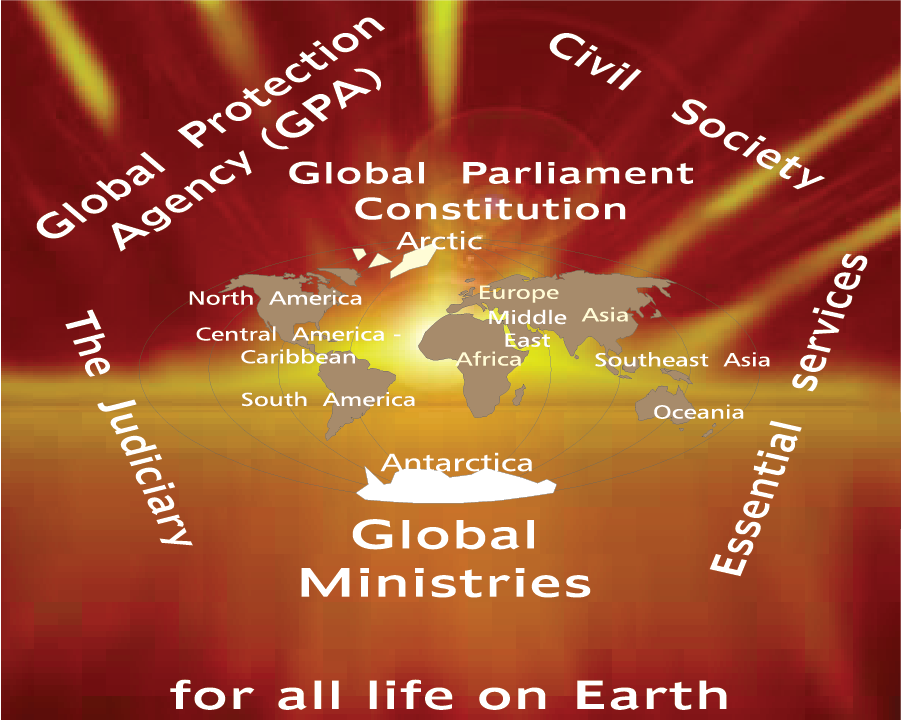
( see enlargement
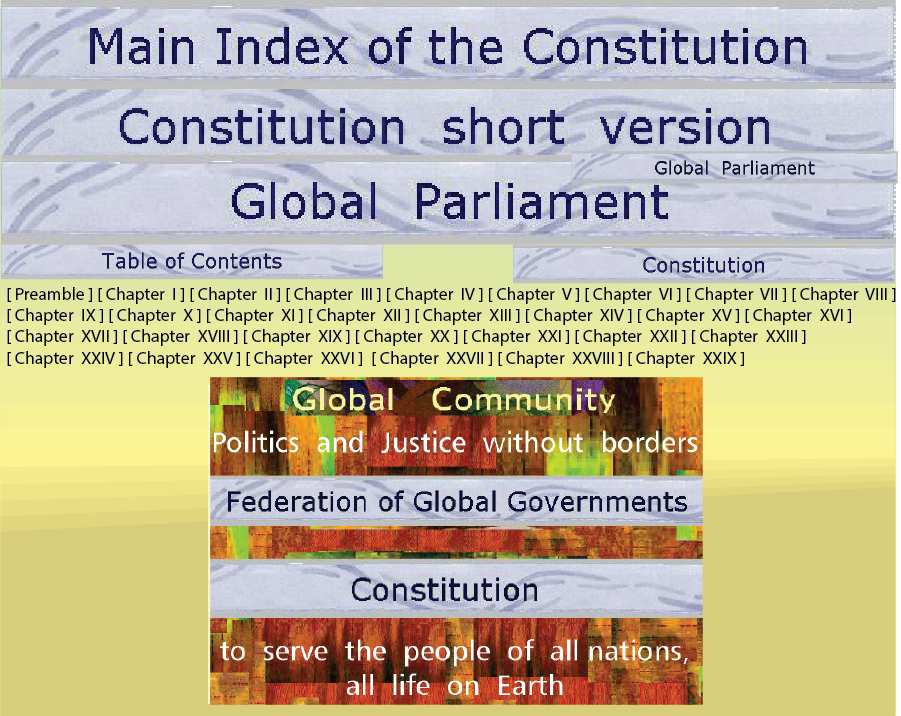
( see enlargement
Frames A24 and A25
The GPA recommendations:1. Ban military action in all parts of the world;
2. Lead the way in creating legitimate power for Global Parliament, subjecting ourselves and multinational corporations to taxation that generates money for programs that are focused on world betterment and world problems. As a mark of our global leadership, we should commit a greater percentage of our resources to this effort than any other organization.
3. Hold ourselves to a high standard of compliance around global treaties that aim for collective benefit and the redress of economic, environmental, military, and political problems. Our adherence should be exemplary. Or, if we truly question the merit of a global accord, we should lead the way in creating agreements that even better serve the global interest rather than simply ignoring or undermining the existing attempts.
4. Exert strong global leadership on multinational solutions to pressing health, environmental, and other problems. We should propose innovative new solutions and show leadership in carrying them out, especially in areas such as clean energy development.
5. Take seriously the process of coming clean by exposing corporate interests in politics, lobbying by powerful organizations, subsidies of fringe military groups, etc. When our global government officials commit to be honest and transparent, a much deeper foundation of international trust will be built.
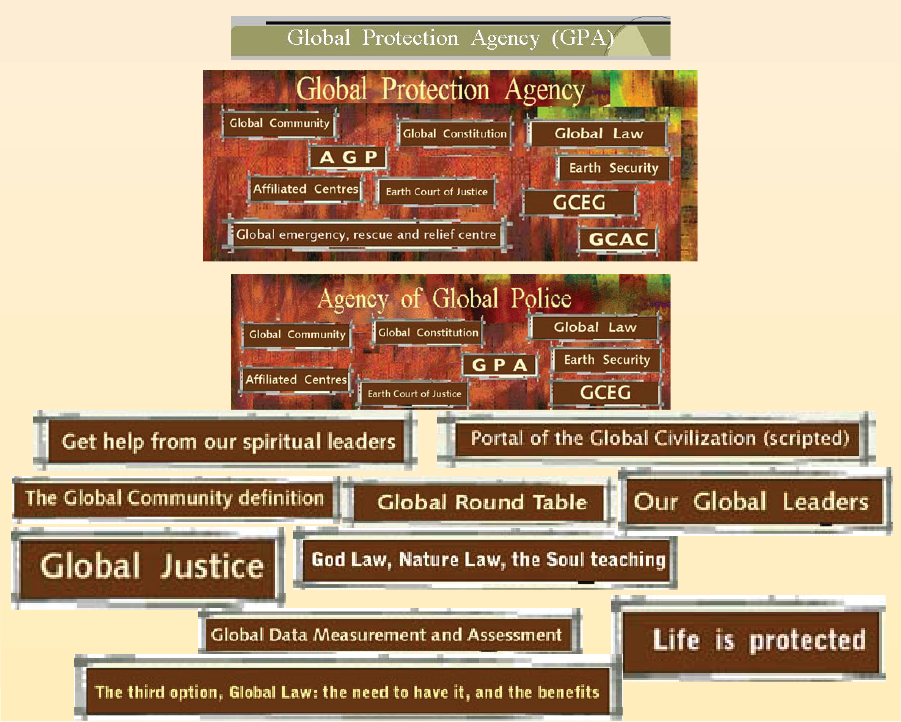
( see enlargement
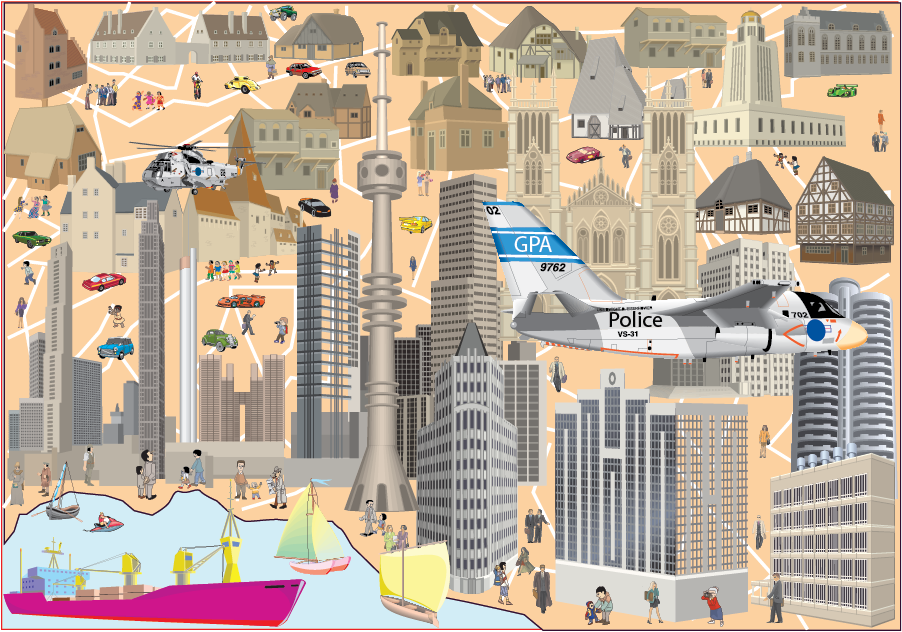
( see enlargement
Frame A26
The greatest happiness of the greatest number is a measure of right and wrong.
How can we be sure that the corporate citizen global ethics proposed here are truly what is needed for humanity's survival?
In society, the proper course of action is one that maximizes the greatest happiness of the greatest number which gives us a measure of right and wrong. What matters is the combined positive effect of everyone and not only of any one person and "not only of the 1% of the population in control of most of the wealth and power".
After the massacre at the HQ of Charlie Hebdo, the media industry got into full gears to direct the population to give approval and support of the five catoonists and their insulting cartoons against the Prophet Muhammad (GR)(GR) and Islam. When there is such fraudulent control by the media over the population, Global Community considers that this is no longer "The greatest happiness of the greatest number is a measure of right and wrong". Global Community considers that it is a fraudulent manipulation of people thoughts and feelings. And that is wrong!
Over the past decades, a Global Dialogue was organized every day of every year to probe the world about what may be the best vision to follow for humanity's survival this century. Results obtained have shown clearly that a significant part of the world population has approved a global ethic with the Scale of Global Rights as being the proper guide for this generation and next ones this century.
Developing ethics that would save humanity from extinction will encounter numerous criticisms from individuals whose basic human rights were violated. But that is to be expected! And there is no other way! Global Community has researched and developed the Scale of Global Rights to continue this process. On the Scale of Global Rights, primordial human rights and the protection of the global life-support systems and ecological rights are on top of the Scale. They are the most important aspects on the Scale. Applying the Scale into our ways of life will require sacrifices from people whose human rights were violated because social values have different degrees of importance on the Scale. But this process is necessary because the 1% of the world population already violated the basic human rights of most people on Earth.
Global Community is this great, wide, wonderful world made of all these diverse global communities. We the Peoples, Global Community, are reaffirming faith in the fundamental human rights, in the dignity and worth of the human person, in the equal rights of men and women and of nations large and smalll. We the Peoples implies every individual on Earth. Earth management and good governance is now a priority and a duty of every responsible person on Earth.
Earth governance gives a new meaning to the notions of territoriality, and non-intervention in a state way of life, and it is about protecting the cultural heritage of a state. Diversity of cultural and ethnic groups is an important aspect of Earth governance. Earth governance is a balance between the rights of states with rights of people, and the interests of nations with the interests of the Global Community, the human family, the global civil society. Earth governance is about the rights of states to self-determination in the global context of Global Community rather than the traditional context of a world of separate states. Although Global Community ensures state governments that it will obey the principle of non-intervention in domestic affairs, it will also stand for the rights and interests of the people within individual states in which the security of people is extensively endangered. A global consensus to that effect will be agreed upon by all Member Nations.
The major transition to a more sustainable world lies in the distinction between, on the one hand, the ownership of land and other key natural resources and, on the other, the many benefits that these ecosystems provide to people regardless of ownership. The old ways are no longer morally nor even economically acceptable.
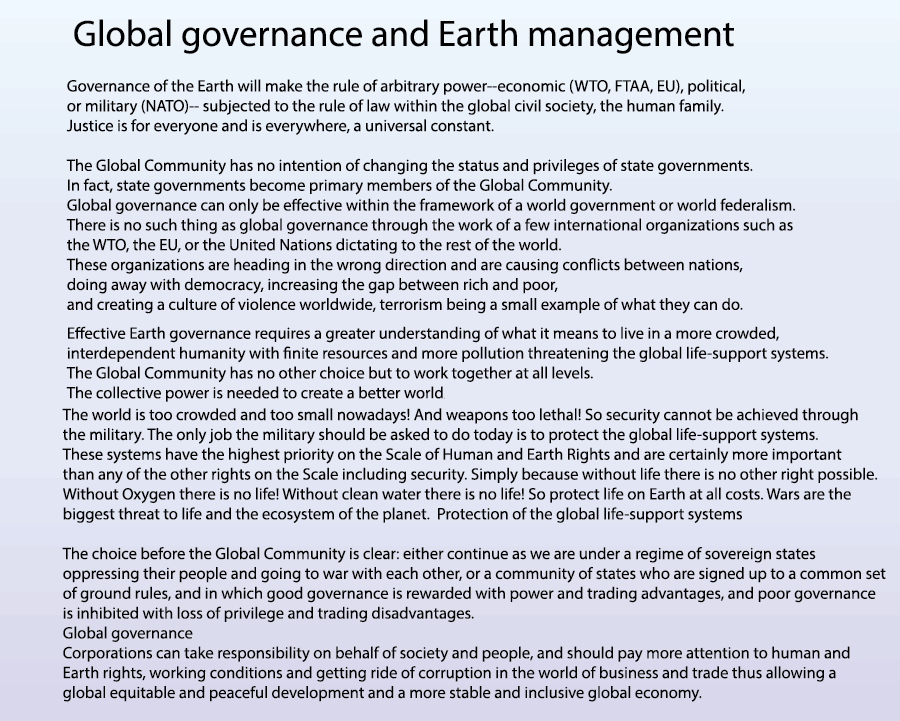
( see enlargement
Frames A27 and A28
Over the past decades, Global Community has been promoting the formation of several global ministries for the proper governance of Earth. Global ministries are world wide organizations just like the World Trade Organization (WTO) for trade and therefore should have the power to rule on cases as that of the WTO.
The formation of global ministries is the most important event in human history. Humanity sees the need to manage the world affairs in several aspects of our lives: energy, agriculture, environment, health, Earth resources, Earth management, security and safety, emergencies and rescues, trade, banks, speculation on world markets, peace, family and human development, water resources protection, youth, education, justice, science and technology, finance, human resources, ethics, global rights, sustainable development, industry, and the manufacturing of products. Global ministries will be given power to rule themselves in harmony with each other.
- Global Ministry of World Population

- Global Ministry of Essential Services

- Ministry of Global Resources

- Ministry of Global Peace in government

- Earth Environmental Governance

- Earth Ministry of Health

- Global Ministry of Forests

- Global Ministry of Agriculture, Food Production and Distribution

- Global Civilization Ministry of Peace and Disarmament

- Ministry of Intergovernmental Affairs: Global Government of Africa

- Global Ministry of Water Resources Protection

- Global Environment Ministry
- Sustainable Development Global Information Society
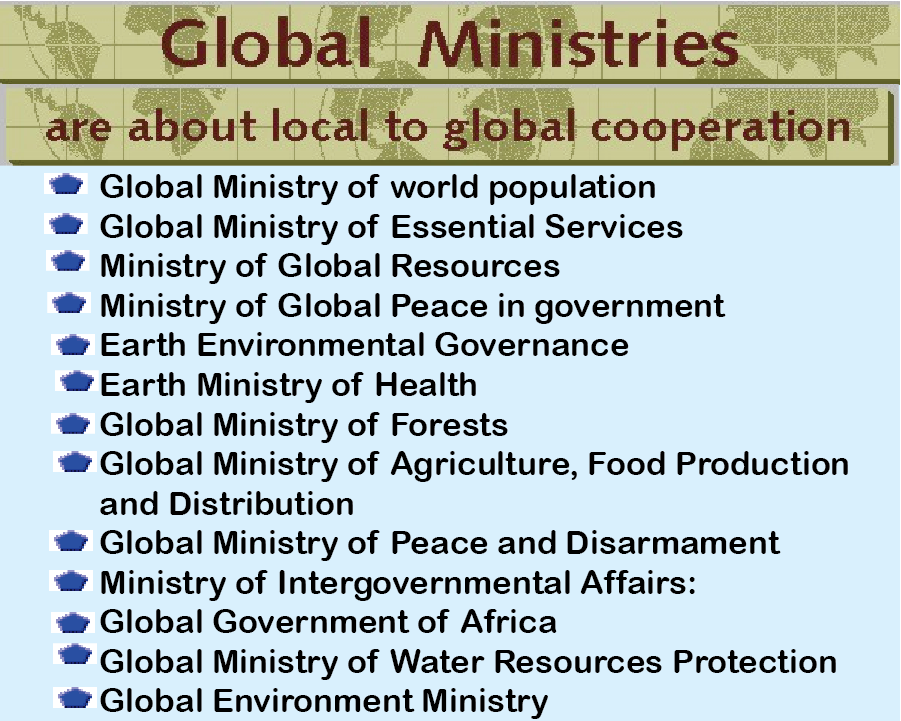
( see enlargement
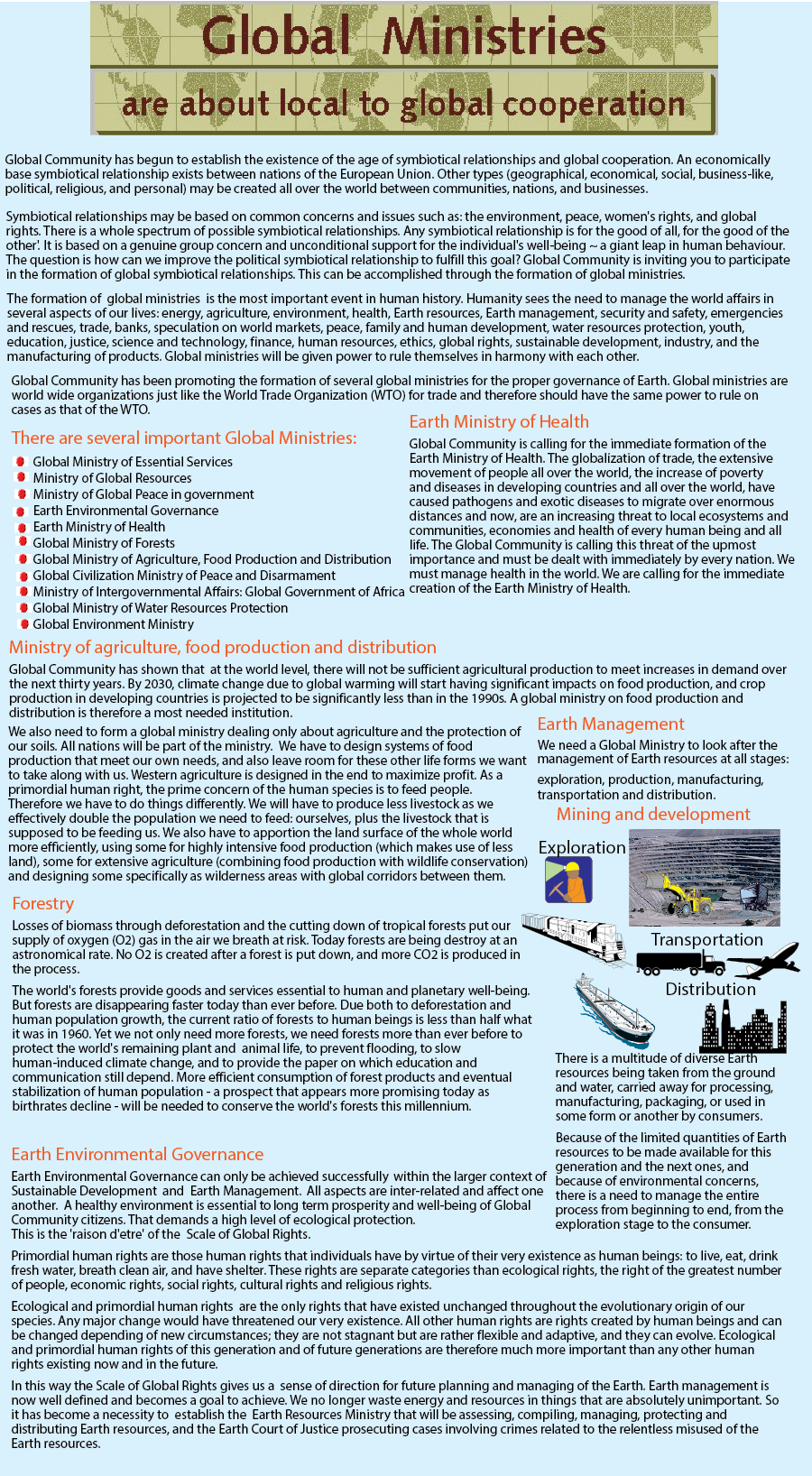
( see enlargement
Frame A29
Our world is facing crises of freshwater, food, deforestation, ocean health, and destruction of the global life-support systems. We need leadership in the protection of all our natural resources, in peril because of what we do and what that does to our planet. We are facing a fresh water crisis. We are facing a food crisis. We are facing a crisis over deforestation. And we are facing crises in our oceans. While carbon emissions from fossil fuels pollute the air, land and our oceans, we are facing the climate change crisis. But all these crises are due to human activities, our ways of doing business and trade, and to our ways of consuming resources. Now is the time to press for leadership. Global Community offers such leadership. Follow SoulLife!
We need ways of organizing ourselves to help us live in a world with less energy and to grow strong caring communities in which we get more of our human satisfaction from caring relationships and less from material goods. We need to reclaim the ideal of being a democratic middle-class people without extremes of wealth and poverty. We need to recover a deep sense of community that has disappeared from many of our lives. This means letting go a sense of ourselves as consumption machines.
Do you see georesources boundaries on our planet? I do. Natural resources are the way of the future. Today there are only limited quantities of resources to be made available now and for the next generations. A Global Resources Ministry is needed to look after the management of Earth resources at all stages: exploration, production, transportation, manufacturing and distribution.
Earth natural resources belong to the community where they are found and to the Global Community to be protected and developed for the maximum benefit of all people and of all life on the planet. Responsible and accountable government and global citizens is what humanity needs and wants. Global Community deserves nothing less. Global Community has a vision of Peoples working together building a new civilization, Global Civilization, including a healthy and rewarding future for the next generations. Global cooperation brings people together for a common future for the good of all.
The work done by Global Community is important for this generation and future generations. We need to educate the coming generations with good principles, being compassionate, social harmony and global sustainability being some of them. They are global commons for survival and a basis for humanity's new vision of the world.
Territorial conflict has for millennium been the basis of war and mass killing of others. Throughout the ages wars have been fought over land, and other Earth natural resources. We have seen oil conflicts in the Persian Gulf, and the Caspian Sea Basin. We have seen water conflicts in the Nile Basin, the Jordan, and Indus River Basins. We have seen wars being fought over minerals and timber in Brazil, Angola, Cambodia, Columbia, Congo, Liberia, the Philippines, and Indonesia. The view from space shows us a global landscape in which competition over resources is the governing principle behind the use of military power. Truly, resources have become the new political boundaries.
When people know they own the resources in their communities then people can start directing the wealth of their resources towards the building of local-to-global economic democracies in order to meet the needs for food, shelter, universal healthcare, education, and employment for all in their community. Global rights will help here. Global rights allow people to do what they need to do in order to be sustainable. People and communities are protected by global rights.
When you do exploration work, develop, manufacture, produce, mine, farm or create a product, you become legally and morally responsible and accountable of your product from beginning to end (to the point where it actually becomes a waste; you are also responsible for the proper disposable of the waste). This product may be anything and everything from oil & gas, weapons, war products, construction products, transportation and communications products and equipment, to genetically engineered food products. All consumer products! All medical products! All pharmaceutical products! In order words, a person (a person may be an individual, a community, a government, a business, an NGO, or an institution) becomes responsible and accountable for anything and everything in his or her Life.
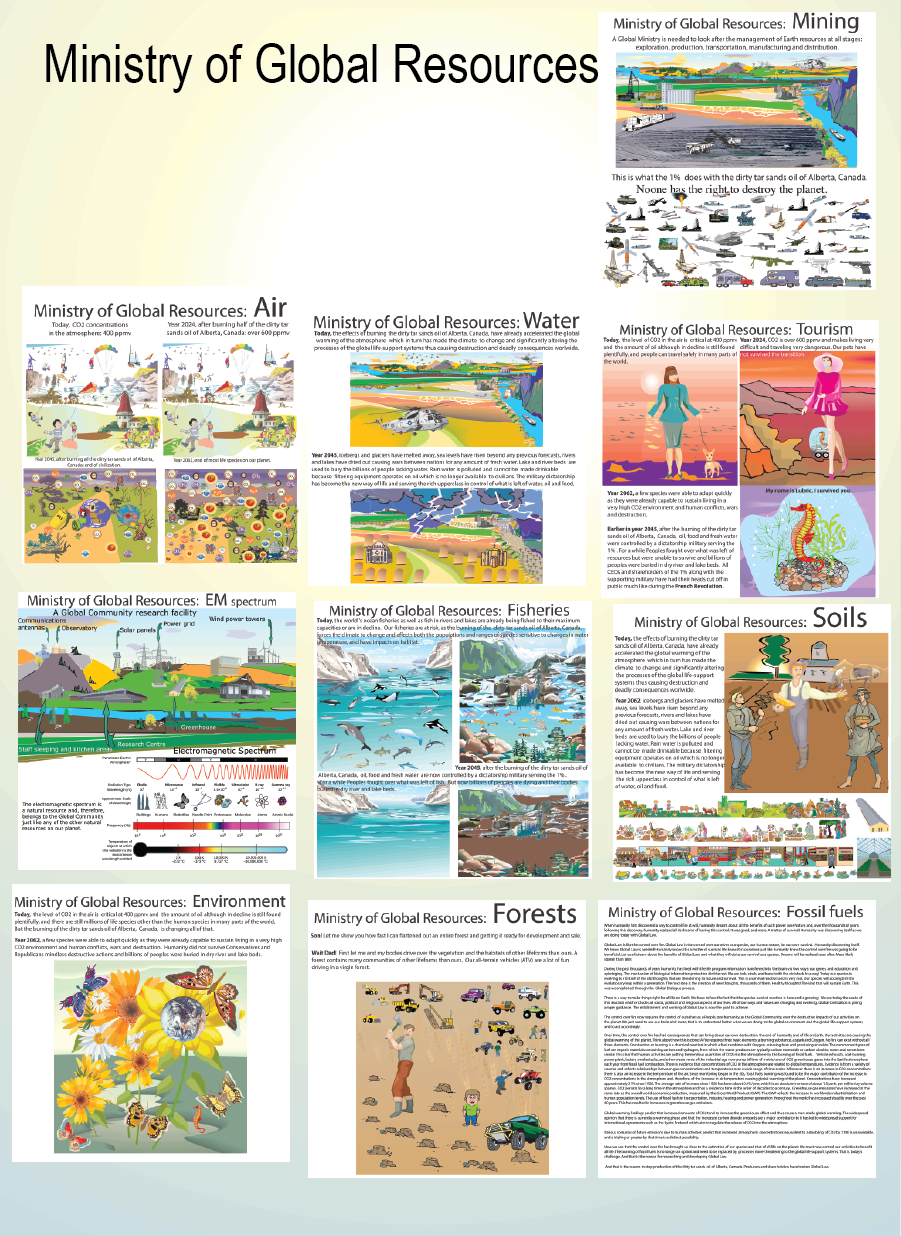
( see enlargement
Frames A30 to A32
As universal values, equality, justice and freedoms are concerned with our ability to decide, to choose values and to participate in the making of laws, and they are dependent on the recognition of other people. These values forbid any form of discrimination on the grounds of race, nationality, sex, religion, age or mother tongue. By accepting both values of freedom and equality we can achieve justice. One can be answerable for one's actions in a 'just' way only if judgements are given in the framework of democratically established laws and courts. Social justice is another universal value to which the Global Community aspires and accepts as a universal value. Social justice consists in sharing wealth with a view to greater equality and the equal recognition of each individual's merits. All persons within a given society deserve equal access to goods and services that fulfill basic human needs.
The Global Community Global Justice Movement has many inter-related components: monetary, social, economic, environmental, democracy, and peace. Global Community Global Justice Movement promotes new thinking to benefit all economies and societies – the true, fair, democratic and efficient solution to poverty. Global Community has the productive resources to eliminate poverty and injustice. Humanity is now in the process of developing the democratic and transparent communications infrastructure which can bring this about.
Our approach transcends left-wing/right-wing designations. We see both conventional capitalism and socialism as being two arms of a philosophy which concentrate power in an elite, to the detriment of society as a whole. Reforming the current money system, to empower each and every person, is a first step for justice.
The Global Community Global Justice Movement stands for:
1. Each person has the right to have warmth, clean air, clean water, food and housing, along with access to a quality health and educational system.
2. Every person should be respected, equal, free and able to choose their own destiny.
3. Everyone should be able to fulfill their full emotional, intellectual and spiritual potential.
4. Every person must respect the rest of creation and take responsibility for preserving the environment including the fauna and flora, all of which are interdependent and share a divine origin with humanity.
5. The inalienable rights of the individual include the rights of life, liberty, access to productive property, truly free markets, and equal justice before the law.
6. Global Economic System that is fair for all.
7. It is the duty of democratic government to secure the results the people want from the transparent management of their public affairs, as far as such results do not infringe on the rights of the individual.
8. The Global Community Global Peace Movement is about educating ourselves to engage in personal diplomacy in another country. We are given opportunities to meet and listen to some of the leading authorities on such subjects as humanitarian and volunteerism, education, politics, historical, social and cultural perspectives, conflict management, teamwork, world affairs, community involvement, and religion.
9. Global Justice for all Life on the planet and it is about:
* establishing respect for human and Earth rights;
* implementing a global regulatory framework for capitals and corporations that emphasizes global corporate ethics, corporate social responsibility, protection of human and Earth rights, the environment, community and family aspects, safe working conditions, fair wages and sustainable consumption aspects;
* establishing freshwater and clean air as primordial human rights;
* practicing tolerance and living together in peace and harmony with one another as neighbours;
* promoting the economic and social advancement of all peoples;
* maintaining peace and security in the world by using negotiations and peaceful means;
* finding unity in diversity with all Life;
* establishing the respect for the life-support system of the planet;
* keeping Earth healthy, productive and hospitable for all people and living things,
* applying the principle that when there is a need to find a solution to a problem or a concern, a sound solution would be to choose a measure or conduct an action, if possible, which causes reversible damage as opposed to a measure or an action causing an irreversible loss.
The universality of human rights recognizes the right of all individuals to participate in the cultural life of their community and of other country, to receive education and training, and to be informed. Global Community is aware that traditional customs and standards could burden the sustainability of all life on Earth. They could burden Earth society or any society forever, and holds individuals in a straitjacket. We cannot accept that. No one can! There are choices to be made and you must make them. Cultures can develop and can go on developing. Even religious beliefs may evolve. We are living now, and we are able to create these changes. We are at least as bright, most certainly brighter, than the people who were living thousand of years ago.
As far as Global Community is concerned, cultural and religious differences cannot be a reason or an excuse or a pretext for not respecting human rights and, most importantly, ecological rights. Quite the contrary, all kinds of cultures may promote human rights and especially cultural rights. They are different in their achievements, but they are equal in dignity where they are expressions of freedom. At any time or in any given place, men, women and children use their culture to invent new ways of making human rights a living reality. Diversity enriches us if it respects the dignity of each individual, and if it takes account of human rights as a whole.
Those things that are usually thought to be good, such as intelligence, perseverance and pleasure, sometimes fail to be intrinsically good. Pleasure, for example, appears to not be good because when people take pleasure in watching someone suffering, this seems to make the situation ethically worse. So that makes it hard to understand ethics based on the Scale of Global Rights.
Ethics holds that moral correctness evolves similarly to scientific knowledge: socially over the course of many generations. Thus, we should prioritize social reform over attempts to account for consequences, individual virtue or duty. And that is what Global Community ethics have been about over the past decades.
There are several obvious applications of Global Community ethics. For instance, for those who work in the mass media, they should report for the sake of truth. They do not stand above morality but have the obligation to respect human dignity, global rights, and fundamental values; they are duty-bound to objectivity, fairness, and the preservation of human dignity; they have no right to intrude into individuals' private spheres, to manipulate public opinion, or to distort reality.
And that is what really happened on January 7, 2015, in France. The five cartoonists were killed because they insulted the Prophet Muhammad (GR)(GR) and Islam.
The media industry includes the movie and television program industry. They are major sources of global unsecurity. They display a culture of violence in everyday life on television screens and cinemas. The American Way of Life is creating this culture of violence. An american child at age six year old has seen more violence on television than any other child of the Middle East over a life span. This culture of violence infects both industrial and developing countries, rich and poor. This trend of culture of violence must end. The movie and TV industry is a threat to global security. The media is responsible for the propagation of violence through communications. Why has government not done anyhting to regulate the media industry? Surely everyone understood that on the Scale of Global Rights security of a nation is more important than the human rights related to the freedom of expression of the media industry. Security of the people and the state is on top of the Scale. It is part of the primordial human rights. While freedom of expression is a right found lower on the Scale and is classified partly as
So the freedom of expression of a person is not as important as the security of that person and the security of the state.
* Community rights and the right that the greatest number of people has by virtue of its number (50% plus one) and after voting representatives democratically (these rights can be and are usually a part of the constitution of a country)
and partly as
* Economic rights (business and consumer rights, and their responsibilities and accountabilities) and social rights (civil and political rights)
When analyzing the event that occurred in France it is heartbreaking to apply the Scale of Global Rights. On January 7, 2015, two Islamist gunmen forced their way into and opened fire in the Paris headquarters of Charlie Hebdo, killing twelve: staff cartoonists Stephane Charbonnier (chief editor Charb), Jean Cabu, Philippe Honore, Bernard Verlhac (Tignous) and George Wolinski, economist Bernard Maris, editors Elsa Cayat and Mustapha Ourrad, guest Michel Renaud, maintenance worker Frederic Boisseau, and police officers Frank Brinsolaro and Ahmed Merabet, and wounded eleven, four of them seriously. During the attack the gunmen shouted "Allahu akbar" (God is great) and also "the Prophet is avenged".
The police officers were there to protect the five staff cartoonists against such an attack. According to the Scale of Global Rights the cartoonists had no rights of making fun of the Prophet (GR) and so should have been arrested and thrown in jail a long time before January 7. So why were they still doing funny cartoons against the Prophet (GR)? Why were they protected by the officers? Surely they would still be alive today had they been arrested.
Question is now on what legal grounds should they have been arrested? Obviously ethical grounds! Political leaders were keen in blaming everybody but themselves. None of them had any thoughts whatsoever about the ethical reasons that should have been followed in making legislation protecting the Prophet (GR) from being making fun of by cartoonists. In my country a person can be arrested for writing graffitis on walls and buildings. A tragic example of such action is the Syrian uprising (see chapter on Education). So why were the cartoonists not arrested on ethical grounds? Beside, what they were doing has affected global security in a big way. And global security is a right in Section 1 on the Scale of Global Rights. The cartoonists could have been arrested because what they were doing affected global security. In a way they were terrorists themselves! In many countries "writing" can have you thrown in jail and even killed. So why were the cartoonists not arrested for being terrorists?
For example, in the question of global justice, the conflict is between the claims of the nation state and citizens on one side and the claims of all citizens of the world. Traditionally, priority has been given to the claims of nations, but in recent years thinkers known as global citizens have pressed the claims of all citizens of the world. Global Community represents all global citizens, all lifeforms, and stands for global justice. Political ethics deals not mainly with ideal justice, however, but with realizing moral values in democratic societies where citizens disagree about what ideal justice is. In a pluralist society, how if at all can governments justify a policy of progressive taxation, affirmative action, the right to abortion, universal healthcare, and the like? Political ethics is also concerned with moral problems raised by the need for political compromise, whistleblowing, civil disobedience, and criminal punishment.
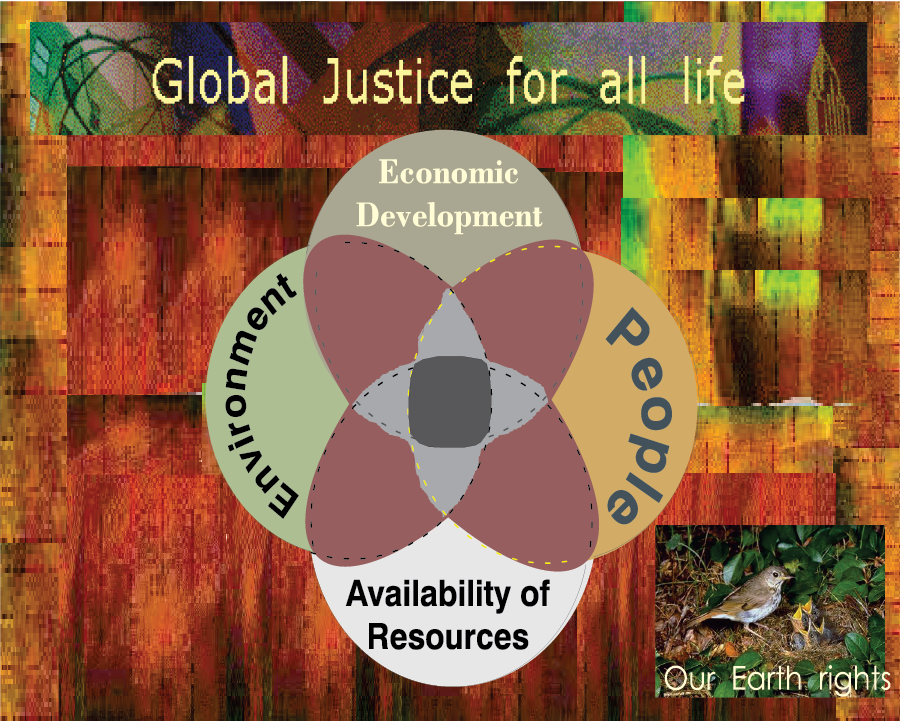
( see enlargement
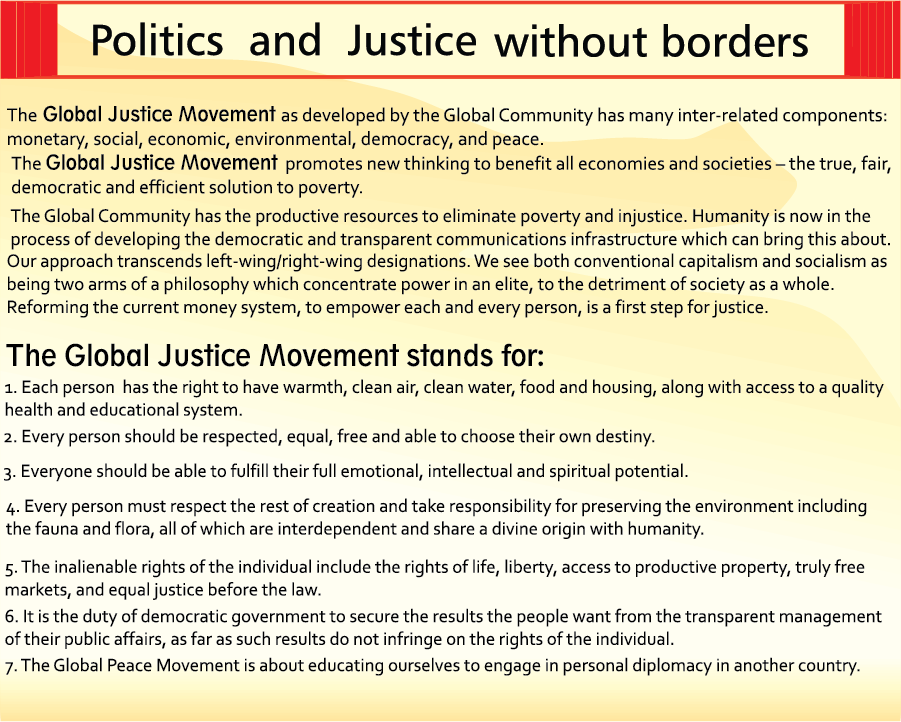
( see enlargement
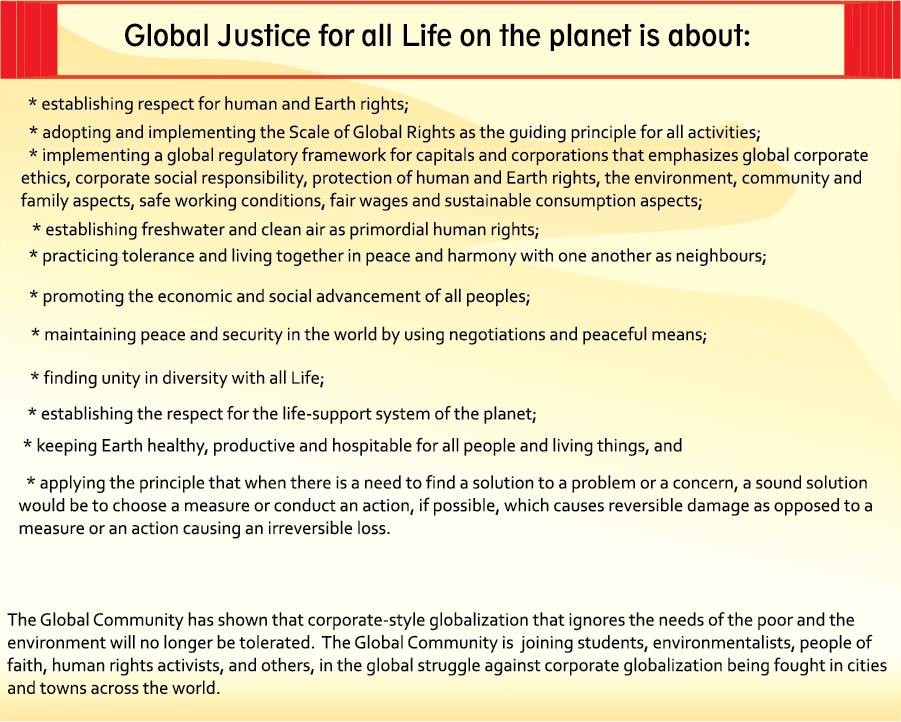
( see enlargement
Frame A33
A very important legislation is the Global Citizens Rights, Responsibility and Accountability Act which, after its approval by Global Parliament, will define rights, responsibility and accountability of all global citizens. Each and everyone of us will make decisions, deal with one another, and basically conduct our actions as per the Act. The final document will be brought forward for approval during the Tenth Global Meeting of the Global Community Earth Government , Fall 2006. People from all nations of the world, and all National Governments, are invited to amend the document proposed here today. This document is now a part of Global Dialogue 2006 and is open for questions and discussions. Participate now. Proceedings of Global Dialogue 2006 will show the final version to be brought forward for approval by Global Parliament.
Global Community is proposing ethics to live by for life's survival on our planet. The illusion (Hope) being the belief that humanity can be repaired by some ethic principle. Humanity urgently wants social and ecological reforms, as well as a spiritual renewal to add trust, meaning, standards and practical guidelines to this new quest for survival. Global citizens want a spiritual home to do good and avoid evil in all its forms. This paper on global ethics is intended to clarify what this means.
This of course assumes humanity needs repairs. If so how and why? Dont we have human rights to live by? Yes, we do! Dont we have something to protect the global life-support systems without which life on Earth would be extinct? Yes, we do! Dont we have ethics in all professions? Yes, we do! Dont we have religions to teach us about good moral values to live by? Yes, we do! Are we not mostly good Peoples doing the best they can? Yes, we are! So why do we need repairs for? How can we be better Peoples than we are already?
How? Why? This is what this paper is about.
Not sure ethics are the answer to humanity's problems! But ehtics will certainly show the way to the survival of life in all its forms on our planet.
The social implications of Global Law
Global Civilization guides humanity for the building of global communities. This is a great opportunity for globallateralism. Global Law includes legislation covering all aspects of human activities. TheGlobal Protection Agency (GPA) will train and lead a global force, bypassing traditional peacekeeping and military bodies such as the United Nations and NATO. The GPA will enforce the law. And that is the third option we offer Global Community . And that is also how we can stop the global warming of the planet and protect the global life-support systems, thus largely improving the quality of life of the next generations.
As we enact global law, we will begin to take on a much deeper kind of global leadership, one that earns more respect than envy and more gratitude than hatred, one that can catapult the whole planet forward into a future where war is no longer thinkable between nation-states and a legitimate and beneficial global government is able to cope with global problems.
Building global communities require understanding of global problems this generation is facing. There are several major problems: conflicts and wars, no tolerance and compassion for one another, world overpopulation, human activities, as population increases the respect and value of a human life is in decline, insufficient protection and prevention for global health, scarcity of resources and drinking water, poverty, Fauna and Flora species disappearing at a fast rate, global warming and global climate change, global pollution, deforestation, permanent lost of the Earth's genetic heritage, and the destruction of the global life-support systems and the eco-systems of the planet. We need to build global communities for all life on the planet. We need to build global communities that will manage themselves with the understanding of the above problems.
Results from previous Global Dialogues have showed us that the governance of Earth through global cooperation and symbiotical relationships was the only possible option for a large population such as the Earth's population, and so, to help achieve this goal we have developed the Global Constitution and the Global Citizens Rights, Responsibility and Accountability Act to govern ourselves as member nations of Global Community.
Legislation and Act
Global Parliament shall enact legislation as laid down in the Global Parliament Constitution. Chapter 12, on the Exercise of Global Parliament competence, and more specifically, Chapter 12.1, on Common provisions, describe the process by which Global Law was enacted.
The legal acts of Global Parliament
1. In exercising the competences conferred on it in the Constitution, Global Parliament shall use as legal instruments, in accordance with the provisions of Chapters 19 to 25, Global Laws, nations'regulations, decisions, recommendations and opinions. A global law shall be a legislative act of general application. It shall be binding in its entirety and directly applicable in all Member Nations. A global framework law shall be a legislative act binding, as to the result to be achieved, on Member Nations to which it is addressed, but leaving the national authorities entirely free to choose the form and means of achieving that result. A global regulation shall be a non-legislative act of general application for the implementation of legislative acts and of certain specific provisions of the Constitution. It may either be binding in its entirety and directly applicable in all Member Nations, or be binding, as regards the result to be achieved, on all Member Nations to which it is addressed, but leaving the national authorities entirely free to choose the form and means of achieving that result. A global decision shall be a non-legislative act, binding in its entirety. A decision which specifies those to whom it is addressed shall be binding only on them. Recommendations and opinions adopted by the Institutions shall have no binding force.
2. When considering proposals for legislative acts, Global Parliament shall refrain from adopting acts not provided for by this Article in the area in question.
Article 229: Legislative acts
1. Global laws and global framework laws shall be adopted, on the basis of proposals from the Global Judiciary , jointly by the Global Parliament and the Earth Executive Council under the ordinary legislative procedure as set out in Article 312. If the two Institutions cannot reach agreement on an act, it shall not be adopted. In the cases specifically provided for in Article 813, global laws and global framework laws may be adopted at the initiative of a group of Member Nations in accordance with Article 312.
2. In the specific cases provided for by the Global Parliament Constitution, global laws and global framework laws shall be adopted by the Global Parliament with the participation of the Earth Executive Council, or by the latter with the participation of Global Parliament, in accordance with special legislative procedures.
Professions are expected to develop up-to-date codes of ethics with specific guidelines in line with the Scale of Global Rights
Corporate citizen global ethics should be consistent with the requirements of morality governing society. If improving survival of all life on our planet is given a moral priority in society, it must also be a moral priority to the corporate citizen, and it may be justifiable to contravene other moral demands in order to meet this goal. Because there are different moral codes that apply to different sections of society and differences in codes between societies, problems will arise when the Scale of Global Rights is applied as a basis of global ethics. The Scale was given a moral priority. So rights lower on the Scale may be affected negatively.
Global citizens may be asked to make sacrifices concerning human rights categorized as less important on the Scale of Global Rights. This would happen only to give the greater good a moral priority and success.
Professions such as scientists, physicians, business people, journalists, and politicians, are expected to develop up-to-date codes of ethics with specific guidelines in line with the Scale.
Global Community ethic for a business proposed here provides no direct solution for all the extensive problems of humanity. The ethic is giving humanity the moral foundation for a better corporate citizen.
Global Community ethic for a business offers fundamental moral behaviors and irrevocable standards that every corporate citizen and, to some extent if applicable, the public at large may adapt as their own vision for life's survival on our planet. You need not be religious to make this vision yours. This vision is for all corporate citizens, regardless of their social origin, language, culture, sex, skin color, religious and non-religious. Global Community vision creates new hopes, standards, ideals and goals for corporate citizens to embrace freely, and live a life without fear.
Corporate citizens have a binding responsibility for the welfare of all humanity and care for all life on Earth. Global Community ethical grounds for a business are practical, real, and applicable for all corporate women and men of good will, religious and non-religious.
Ethics for a business
Global Community ethics for a business are about how we treat others and a commitment to respect every person humanely and with dignity. For this process to work, global citizens learn to forgive, be patient and compassionate, promote acceptance, open theirs hearts to one another, and practice a culture of solidarity and cooperation. Let go narrow differences between us all for the greater good of humanity and future generations.
Morality can be derived from a standard that global citizens believe should be universal such as Global Community ethic for a business which include all lifeforms over the entire Universe.
Global Community ethic for a business aims to identify principles of right action that may be used to guide people in their lives. These principles can be used to decide whether particular courses of action, or particular types of action, are right or wrong. Ethics emphasizes respect for persons, and holds that there are certain actions that should never be done. This is what this paper is about: to describe those principles and propose a list of right actions for a business.
Global ethic for a business must always be grounded in realities.
1. As a business you may:
a) be a corporate eco-friendly
b) be a socially responsible investor
c) have taken the challenge of a more integrated approach to corporate responsibility by placing environmental and community-based objectives and measures onto the decision-making table alongside with the strategic business planning and operational factors that impact your bottom-line results
d) provide not only competitive return to your shareholders but you also operate your business in light of environmental and social contributions, and you have understood the interdependence between financial performance, environmental performance and commitment to the community
e) have taken a full life-cycle approach to integrate and balance environmental and economic decisions for major projects
f) have an active Environmental, Health and Safety Committee and integrated codes of conduct, policies, standards and operating procedures to reflect your corporate responsibility management
g) have scored high on categories such as:
* environmental performanceh) support a balance and responsible approach that promotes action on the issue of climate change as well as all other issues related to the global life-support systems:
* product safety
* business practices
* help small business in the least developed countries
* commitment to the community
* abolition of child labour
* eliminate discrimination in respect of employment and occupation
* employee relations and diversity
* effective recognition of the right to collective bargaining
* corporate governance
* share performance
* global corporate responsibility
* against corruption in all its forms, including extortion and bribery
* health, safety and security
* provided help to combat diseases at home and abroad
* uphold the freedom of association
* audits and inspections
* emergency preparedness
* corporate global ethical values
* ensured safe working conditions
* standards of honesty, integrity and ethical behaviour
* elimination of all forms of forced and compulsory labour
* in line with the Scale of Global Rights
* primordial global rights deterioration
* global ocean acidification
* global warming
* Ozone layer depletion
* wastes of all kind including nuclear and release of radiation
* climate change
* species of the fauna and flora becoming extinct
* losses of forest cover and of biological diversity
* the capacity for photosynthesis
* the water cycle and fresh water use
* food production systems
* genetic resources
* Oxygen supplies
* change in land use and lost of agricultural soils
* phosphorus and nitrogen cycles
* chemicals produced for human use and not found in nature and, eventually, reaching the environment with impacts on Earth's waters, soils, air, and ecology
* ship Captains and owners dumping waste oils in oceans
* human activities of all kinds have disastrous impacts on the life-support systems: overfishing and bottom trawling, car and truck manufacturers using fossil fuels, etc.
As a business you may have scored high on all of the above challenges but Global Community wants you to take on even greater challenges in line with Global Community ethic for a business.
2. Checks and balances
In the past, corporations ruled without checks and balances. Now, global ethics will be a basic minimum to do business, and there will be checks and balances. Our judgement will be based on global ethics. Global ethics must always be grounded in realities. But realities are changing constantly and are different in different places. We live in a world that makes progress toward democracy. Ethics and morality exist only when human beings can act freely.
In our free society, rights are tied to responsibilities. Corporations are committed to improvement in business performance and want to be seen as 'good corporate citizens' on a local and a global scale. Corporations have social responsibilities as they are an integral part of society. Global ethics recalls that those realities, on which others build upon, have to be protected first. Global Community has found evident that universal values and the Scale of Global Rights as described above were the foundation of global ethics for a business.
3. Corporate citizen global ethic
Global Community has now at hand the method and framework to conduct societal checks and balances based on a method reinforcing global ehtics for a business. A more balance world economy will result of annual checks and balances. Corporations will take their social responsibilities and become involved in designing, monitoring, and implementing these checks and balances. Several corporations have already done so. Results will be taken into account in the evaluation of a global ethic for a business. Corporations are required to expand their responsibilities to include global rights, the environment, community and family aspects, safe working conditions, fair wages and sustainable consumption aspects.
A corporation will now be required to operate its business as per global ehtics for a business:
* Be concerned with issues such as climate change, bio-diversity, pollution prevention and adopt high standards
* Minimize environmental degradation and health impacts
* Be responsible for the environmental impact of its products and services throughout their cycle
* Adopt a wide environmental code, and policies, health and safety practices and procedures aimed at reducing resource and energy use in each stage of a product or service life-cycle
* Set up appropriate management systems to implement policies
* Conduct annual checks and balances and provide reports to the community
* Respect the political jurisdiction of national communities
* Respect human rights, social and cultural rights
* Recognize its political and economic impact on local communities
* Contribute to the long-term social, cultural, environmental and economic sustainability of the local communities
* Respect the rights of indigenous peoples, their culture and land, and their religious and social customs; provide employment and training opportunities
* Ensure that each employee is treated with respect and dignity and is not subjected to any physical, sexual, psychological or verbal harassment or abuse
* Respect employees' right to freedom of association, labour organization, and free collective bargaining
* Provide equal pay for work of equal value to women and men
* Recognize the responsibilities of all workers to their families, and provide for maternity leave, and paternity leave
* Ensure that their be no barriers to the full participation of women within the company
* Participate in the creation of child care centres and centres for the elderly and persons with disabilities where appropriate
* Ensure no discrimination on grounds of race, ethnicity, or culture
* Ensure that persons with disabilities who apply for jobs with the company receive fair treatment and are considered solely on their ability to do the job; provide resources and facilities which enable them to achieve progression in employment in the company
* Provide training to all employees to conduct their activities in an environmentally responsible manner
* Work with organizations concerned with children's rights, human rights and labour rights to ensure that young workers are not exploited
* Ensure that a mechanism is in place to address ethical issues of concern raised by employees
* Make sure that the company's policies balance the interests of managers, shareholders, employees, and other affected parties
* Adhere to international standards and protocols relevant to its products and services
* Adopt marketing practices which protect consumers and ensure the safety of all products
* Conduct or support research on the environmental impacts of raw materials, products, processes, emissions and wastes associates with the company and on the means of minimizing such adverse impacts
* Make a sustainable use of renewable natural resources such as water, soils and forests
* Conserve non-renewable natural resources through efficient use and careful planning
* Conserve energy and improve energy efficiency of internal operations and of the goods and services being sold
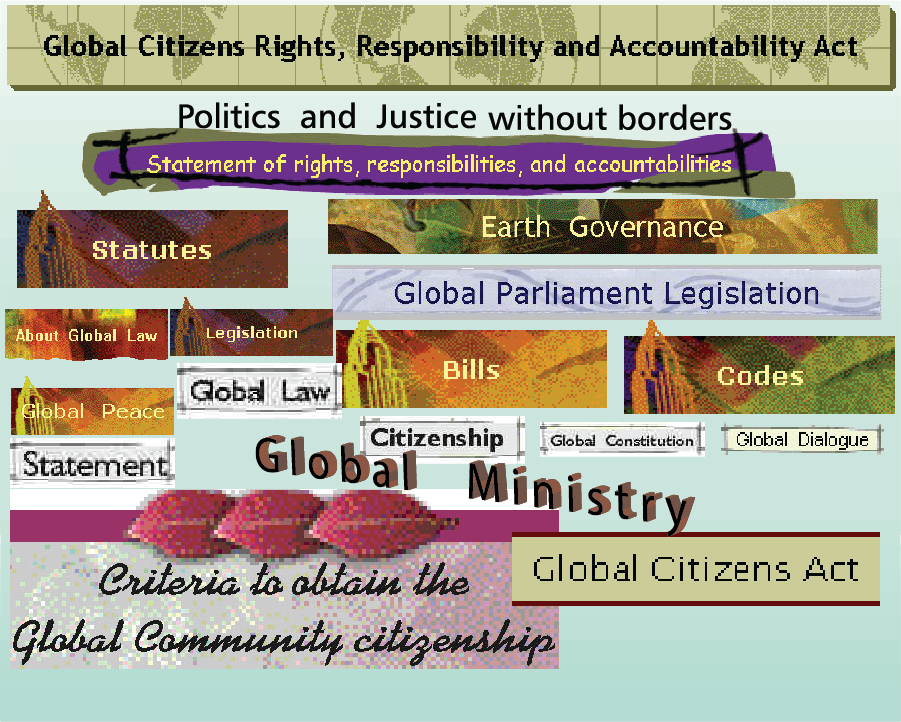
( see enlargement
Frame A34
Leadership
To act as a global policing force, as the GPA aspires to do, many foundations must be laid, especially regarding the move from wielding power derived from Global Community to legitimate global leadership. There are many required characteristics that are prerequisite for legitimate leadership:1. Legitimate leadership is built upon trust. Those who are led must largely believe that the leader is committed to integrity, honesty, and transparent inquiry into problems. The leader’s actions must align with his words
2. Legitimate leadership rests upon checks and balances, which are necessary to ensure power is not corrupted.
3. Legitimate leadership is an act of service. Those in power must show a primary interest in the good of the collective ahead of their self-interest. In this way, true leaders are mission-centered rather than self-centered.
4. Legitimate leadership empowers others appropriately rather than concentrating power disproportionately. In other words, true leaders produce more leaders and empower them as situations demand.
5. Legitimate leadership is visionary, carrying the torch of a possible future.
6. Legitimate leadership is willing to lead by example, including following a foundation of ethics, performing more than one’s share of work, and making sacrifices where appropriate.
7. Legitimate leadership is compassionately fierce when something undermines the good of the whole. In a company this might mean the CEO fires a slacking employee. In a city, the police may jail a murderer. On a global level, this might even mean arresting those breaking global law.
The defence function of a leader requires that he safeguard the good of the whole by whatever the most skillful means are to accomplish that defence.
While that is not a comprehensive catalog of leadership prerequisites, I do think those few requirements are foundational and relatively unquestionable. Without at least a solid foundation of those requirements, the GPA’s actions among nation-states will remain those of a unilateralist leader rather than a global leader. We will be, and should be, legitimated in the role of a global leader among nation-states and validated as an enforcer of global law. Global Community offers a few recommendations for actions that would strengthen and legitimate the GPA’s role as a true global leader by gradually creating an international structure that better safeguards the whole than we can ever do now as a unilateralist leader.
Global warming and agriculture
Weather conditions such as temperature, radiation and water, determine the carrying capacity of the biosphere to produce enough food for the human population and domesticated animals. Any short-term fluctuations of the climate can have dramatic effects on the agricultural productivity. Thus, the climate has a direct incidence on food supply. In the coming years, unless population size is stabilized, agriculture will have to face an increasing challenge in feeding the growing population of the world.
World with slower population growth
Clearly the environmental challenges facing humanity in the 21st century and beyond would be less difficult in a world with slower population growth or none at all.
Population is a critical variable influencing the availability of each of the natural resources considered here. And access to family planning services is a critical variable influencing population. Use of family planning contributes powerfully to lower fertility, later childbearing, and slower population growth. Yet policymakers, environmentalists and the general public remain largely unaware of the growing interest of young people throughout the world in delaying pregnancies and planning their families. In greater proportions than ever, girls want to go to school and to college, and women want to find fulfilling and well-paid employment. Helping people in every country to obtain the information and services they need to put these ambitions into effect is all that can be done, and all that needs to be done, to end world population growth in the new century.
Consumers responsibility
No more waiting! Time for action is now! We are all responsible for the creation of global warming, and there are plenty of observable effects. Greenhouse gases are accumulating dangerously in the Earth's atmosphere as a result of human activities, and temperatures are rising globally due to these activities. Climate changes have to be manage without delays.
Global consumption is a very important aspect of globalization. Consumers should be concerned with the impact of their decisions on the environment but also on the lives, global rights and well-being of other people. Since one of the key functions of families as a social institution is to engage in production (selling their labour in return for wages) and consumption (using those wages to buy goods and services), then the role of families has impacts on sustainable consumption and development. Corporations are required to expand their responsibilities to include global rights, the environment, community and family aspects, safe working conditions, fair wages and sustainable consumption aspects. Global Community has summarized the rights of every person on Earth by developing the Scale of Global Rights. The scale will eventually be replacing the Universal Declaration of Human Rights. The Global Constitution established all rights.
Just as corporations have social responsibilities and so do consumers in societies. Consumers are socialized to improve the quality of their lives. Quality of Life is a multi-dimensional, complex and very subjective concept. For instance, someone who has changed their consumption habits to better ensure that their choices will make a better quality of Life for themselves, the environment and future generations, may be seen by others as having a lower or inferior quality of Life since they have removed themselves from the materialistic mainstream characteristic of our consumer society. Someone may feel that an absence of violence and abuse in their Life leads to a higher quality of living even though they have fewer tangible resources, money, or shelter; peace of mind and freedom from abuse has increased the quality of their daily Life relative to what it was like before. There are universal quality of Life values which lead to "human betterment" or the improvement of the human condition. In addition to the value of species survival (human and other living organisms), they include: adequate resources, justice and equality, freedom, and peace. A better quality of Life for all global citizens is a goal for all of us and one of our universal values.
Consumption, resources and overpopulation
Despite humanity's success in feeding a growing world population, the natural resources on which life depends, such as fresh water, cropland, fisheries and forests, are increasingly depleted or strained. In this millennium, population growth continues, meaning that more people will be sharing such finite resources as fresh water and cropland. UN population projections for the year 2050 range from 7.9 billion to 10.9 billion, suggesting the extent to which we can influence our future. More people worldwide are multiplying humanity 's impact on the environment and on natural resources essential to life.
Because of the high per capita consumption of resources in industrialized nations, we have the world's worst population problem! People think of the population problem as being a problem only of "those people" in the undeveloped countries, but this serves only to draw attention away from the difficulties of dealing with our own problems. It is easier to tell a neighbor not to cut forests or create global warming than it is for us not to cut forests and create global warming. With regard to other countries, we can offer family planning assistance on request, but in those countries we have no jurisdiction or direct responsibility. Within our own country we have complete jurisdiction and responsibility, yet we fail to act to help solve our own problem. What the industrialized world can do to help other countries stop their population growth is to set an example and stop our own population growth.
It clear that there will always be large opposition to programs of making population growth pay for itself. Those who profit from growth will use their considerable resources to convince the community that the community should pay the costs of growth. In our communities, making growth pay for itself could be a major tool to use in stopping the population growth. Because of world overpopulation and our never satisfied consumer societies natural resources are being depleted at an alarming rate. Agriculture faces an increasing challenge in feeding the growing world population.
The number of people living in countries where cultivated land is critically scarce is projected to increase to between 600 million and 986 million in 2025. Despite the Green Revolution and other technological advances, agriculture experts continue to debate how long crop yields will keep up with population growth. The food that feeds the future will be raised mostly on today's cropland. The soil on this land must remain fertile to keep food production secure. Easing world hunger could become unimaginably difficult if population growth resembles demographers' higher projections. Soils represent an important component of the terrestrial resources. In fact, more carbon is stored in soils (including peat) than in all of the vegetation of the world!
Overpopulation
While many people understand that population growth must cease if humanity is to survive, no action has been taken on a world-wide basis which will insure that population growth is reduced to a minimum. Earth cannot and will not wait even twenty years before the horrible destruction of humanity commences. Global Community is declaring a moratorium on world population, the fertility rate and immigration applications all over the world, on all applications for immigration, until applicants from any religious or cultural background have satisfied completely Global Community standard for a population fertility rate of 1.3 children per family. The problem with world overpopulation is everybody’s problem. Until tangible progress is made no immigrants should be accepted. That is Global Law.
Overpopulation is a form of population warfare. It is the use of a very high fertility rate to conquer a nation, and that could mean as many as or more than 2.1 children per family. It is a form of cultural and/or religious aggression and invasion by having a much too high number of new born babies. For instance, there has been a rapid increase in population among Muslims to the extent that in 20 years all of Europe and North America are expected to be mostly Islamic. The influx of Latino immigration into the western states of the USA will also have the effect of a population warfare.
Now, obviously what immigration does is to infringe into the most important rights on the Scale of Global Rights: Sections 1, 2, and 3. It amounts at creating and stressing the world overpopulation problem which is way far more destructive than conducting military warfare. Global Community condemns all types of warfare we see in the world today: military, economic and population. Surely the rights to protect the existence of all life on our planet are more important than cultural and religious rights. Sections 1, 2 and 3 on the Scale of Global Rights are certainly more important than Section 6.
No one can feed, educate, and take care of a family with a large number of children. Simply said: if you cannot feed a human family of too many members, dont do it, it is better to refrain from making children. Think of the world population today and in the coming decades, as a family with already far too many members. We all know world population on our planet as over reach its safe and secure capacity. Our human family is breaking down, suffering, crying, hungry, dying, tortured, and in great danger of extinction. Our human family is out of control, abused, taken advantage of by the 1% of its members, and by promoting democracy and human rights destructively.
To reduce consumption levels in industrialised nations, natural resource management would need to be at the forefront of policymaking, and economic growth based on unlimited consumption can no longer be the goal of government policy. Much would also need to be done to let go the culture of consumerism; and private and public investments must be shifted to building and sustaining a low-carbon infrastructure.
After having established a Commons Trust Fund, reduced world population and global consumption, natural resources would be accessible to people in all nations, all global communities, consumed within planetary limits and preserved for future generations.
Overpopulation and consumption
Over the past decades, the recent rapid increase in human population has shown that the planet is no longer able to sustain everyone. Many major global problems, such as greenhouse gases, global warming, and pollution, are aggravated by the population expansion. Global Community has declared that the world is overpopulated. Humans are now threatening other species worlwide. The species extinction crisis is out of control as we are losing 40,000 species per year.
We must alert and organise Global Community to pressure world leaders to take specific steps to solve the two root causes of our crises: exploding population growth and wasteful consumption of resources. Overconsumption and overpopulation underlie every major global problem we face today.
As human population continue to grow, finite reources such as fossil fuels, phosphorous, grain, fish, freshwater, arable land, coral reefs, forests, and other lifeforms species continue being depleted.
Reproductive health services can help
Voluntary family planning and other reproductive health services can help couples avert high-risk pregnancies, prevent unwanted childbearing and abortion, and avoid diseases such as HIV/AIDS and other sexually transmitted infections, that can lead to death, disability, and infertility.
Comprehensive reproductive health services, especially care in pregnancy and childbirth and for sexually transmitted infections, are key to preventing disability and death and improving women's health. Better access to emergency care during childbirth and safe abortion services would also contribute significantly to lower maternal death rates. Family planning diminishes risks associated with frequent childbearing and helps reduce reliance on abortion.
An important obstacle to couple negotiation of contraceptive use and protection from STDs including HIV is that most women have unequal access to resources and decision-making. Yet women are more vulnerable to the consequences of unplanned pregnancies and often HIV/STI's. For these reasons, countering the prevailing gender stereotypes that increase risky behaviors and decrease couple communication is a key strategy for promoting good reproductive health.
Individuals, too, can help bring about a world that is more secure and more supportive of life, health and happiness. They can educate themselves on population dynamics, consumption patterns and the impact of these forces on natural resources and the environment. They can be socially, politically and culturally active to elevate the issues they care about. They can become more environmentally responsible in their purchasing decisions and their use of energy and natural resources. And individuals and couples can consider the impacts of their reproductive decisions on their communities and the world as a whole.
Policies to decrease world population:The vast disparities in reproductive health worldwide and the greater vulnerability of the poor to reproductive risk point to several steps all governments can take, with the support of other sectors, to improve the health of women and their families:
- delay reproduction until later in life. Delaying reproduction is important in influencing population growth rates. Over a period of 60 years, if people delay reproduction until they are 30 years old, you would have only two generations, while if you do not delay reproduction you would have three generations (one generation every 20 years).
- spread your children farther apart
- to have fewer children overall
- government commitment to decreasing population growth
Create policies that help decreasing the number of children being born. Policies such as income tax deductions for dependent children and maternity and paternity leaves are essentially pronatalist and should be eliminated.- programs that are locally designed and that include information on family planning and access to contraceptives
- educational programs that emphasize the connection between family planning and social good
- Give women more life choices. The low social and economic status of women and girls sets the stage for poor reproductive health
- Invest in reproductive health care
- Encourage delays in the onset of sexual activity and first births
- Help couples prevent and manage unwanted childbearing
- Ensure universal access to maternal health care
- Support new reproductive health technologies
- Increase efforts to address the HIV pandemic
- Involve communities in evaluating and implementing programs
- Develop partnerships with the private sector, policymakers and aid donors to broaden support for reproductive health
- Measure Progress
More and more young people on every continent want to start bearing children later in life and to have smaller families than at any time in history. Likewise, in greater proportions than ever, women and girls in particular want to go to school and to college, and they want to find fulfilling and well-paid employment. Helping people in every country obtain the information and services they need to put these ambitions into effect is all that can be done, and all that needs to be done, to bring world population growth to a stable landing in the new century.
Throughout the history of humanity, the rights of human beings have been defined and enshrined with reference to the values of the dignity of each individual and of freedom, equality and justice. These values are universal. Global Community has accepted and enshrined them into its own ways of behaving and dealing with all peoples. Cultures and societies differ so much that their expression takes varying forms, but diversity does not affect the foundation of inalienable values constituted by human and Earth rights. Each individual is recognized as a representative of humankind. Human dignity resides in each of us, and this dignity must be recognized and respected by all.
How meaningful is the right to life or to participation in political life if poverty, gender inequality, destitution and epidemics prevent individuals from enjoying freedom of movement, freedom to vote, to marry and so on? The economic and social rights are the essential prerequisite for the effectiveness and exercise of all other rights (other than the protection of the global life-support systems and ecological rights) recognized for human beings. The developing countries are having a harder time than others to achieve the exercise of these rights on a lasting basis, with the problems of economic globalization presenting new challenges. We must therefore beware of enforcing economic rights alone to the detriment of individual civil rights and the rights of all individuals to decide their own fate and the future of their country, their political rights. The universality of human rights recognizes the right of all individuals to participate in the cultural life of their community and of other country, to receive education and training, and to be informed.
Primordial human rights are necessarily human needs but not all human needs are primordial human rights. To determine rights requires an understanding of needs and reponsibilities and their importance.
Education
Young people have a right to information and education to be able to make the decisions that will form their lives. Without an ethical formation they will hardly be able to distinguish the important from the unimportant. They will not understand living now requires sacrifices and the primary goal of society today is the survival of all Life on our planet. They must be shown at home and in school that violence is not a means of settling differences with others.
In the daily flood of information, ethical standards will help them discern when opinions are portrayed as facts, interests veiled, tendencies exaggerated, and facts twisted.
Young people have human rights but they have to learn what their rights really means and the responsibilities attached to them. They should not be allowed to abuse those rights for personal power gain as we so often seen in the world today.
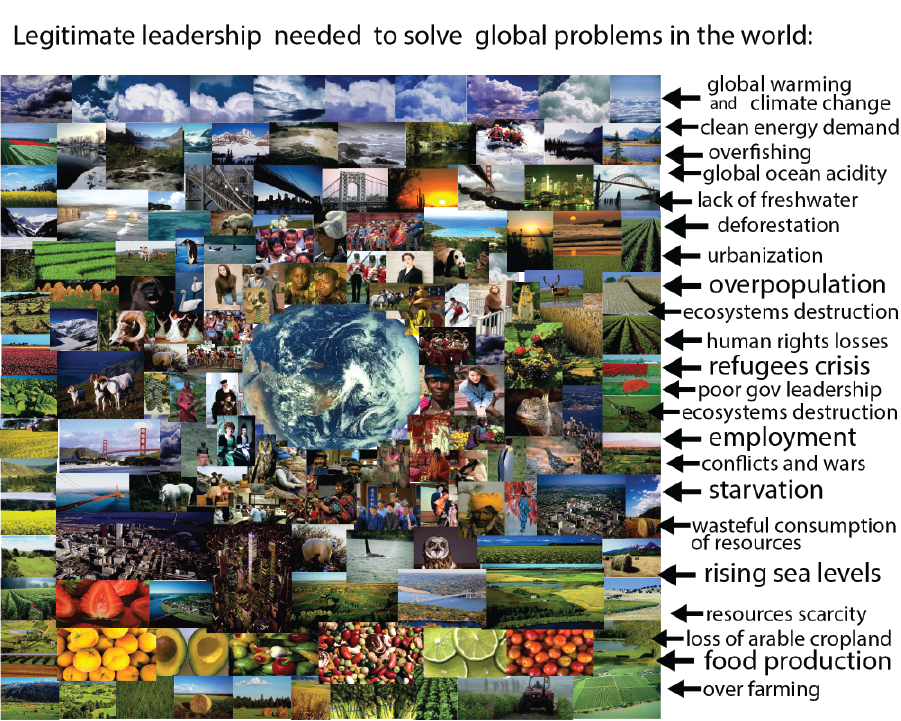
( see enlargement
Frames A35 to A37
Political ethics are also concerned with moral problems
Global Community ethics are concerned about the leaders of countries, politicians, and political parties, because when they lie in the faces of their people, when they manipulate the truth, or when they are guilty of venality or ruthlessness in domestic or foreign affairs, they forsake their credibility and deserve to lose their offices and their voters; conversely, public opinion should support those politicians who dare to speak the truth to the people at all times.
Politicians can be corrupted but the great majority of the people are good and believe 'justice for all' is a universal value. Politicians make global decisions or the lack of them during meetings. Politicians become actors on the world scene. Actors taken jobs they are not always qualified to take in reality. They make decisions, and they dont understand consequences. In effect, the lack of sound leadership from the part of our politicians are threatening the security of all people and all life on Earth.
Security of the world has become a major issue and should be dealt with for the good of all and of all life on Earth. Global Community is the only world organization capable of handling security and the many other global problems.
Before the massacre that happened on January 7 in France, it is obvious that politicians never done their job. Politicians not just in France but in all nations of the Western world have not done their job. They should have passed laws to punish people such as the five cartoonists for publishing insulting cartoons against the Prophet Muhammad (GR)(GR) and Islam. The business Charlie Hebdo should have also been closed down.
Global political parties
Global political parties are certainly the next best thing to talk about after replacing the United Nations by Global Parliament. Actually why wait! We all know it is coming soon. We all know the UN is on its way out! This is the 21st century, and the old ways have to go for humanity survival, for all life on Earth survival. This is the time to remember in all of humanity history. Our time is precious. Life in all its forms needs our help more than ever. We have already explained why for over two decades now. Today, we want action!
Rise up Global Community! Rise up Earth revolutionaries! Rise up! Rise up!
In the above figure we have defined and summarized who we are, what we stand for, and what we need to accomplish. The remaining sections refer to details about how we can get there. Global Parliament Constitution contains the necessary steps that will allow us all move forward taking along with us all of humanity and all other life forms as many as we can. Global Dialogue 2010 is how you can participate in this discussion. Do participate! No fees! Just take the time to volunteer your help.
The world wants an organization dedicated to the welfare of all Peoples and to the protection of the Earth's environment and the global life support systems
We have promoted our definition and meaning of 'global politics'. Global politics now exist because what is happening at the United Nations (U.N.) is totally unacceptable. Very powerful military groups and other types of powerful lobbying groups basically 'run' the U.N. Those with the money run the UN. That in itself is an acknowledgment of defeat of the part of an organization such as the U.N. that is supposed to be representing and protecting "the Peoples" rights; universal values of human dignity, freedom, equality and solidarity; and the principles of democracy and the rule of law. We see none of that! We see chaos. We see international politics, governments worried only about their own self-interests, bullying from nations with the most powerful military, and we see an unsustainable future ahead. It has become clear that the U.N. has promoted a culture of violence, waste, mismanagement and corruption which cannot reform itself. Lobbying groups would never allow a thorough reform of the U.N. organizational structure and of its ways of doing things in the world.
The world wants an organization dedicated to the welfare of all Peoples and to the protection of the Earth's environment and the global life support systems. Such an organization must not be governed by powerful lobbying groups.
We see entire nations making choices based on what is good for themselves, today self-interests, versus what is good for the next generations and all life on the planet. In other words, they make choices between international politics versus global politics. International politics are driven by national interests, self-interests, and powerful lobbying groups, while global politics are about the survival of all of us on the planet.
Global politics is about doing what is right for humanity and all life on the planet.
Global politics is about doing what is right for all of us now and in the future, and for all life on the planet. We base our understandings and actions on principles we all know are rights deep down. You cannot have a nation invading another nation for its resources? its water? its oil and gas? We have chaos without principles! We have conflicts and wars. There are ways of doing things that will give everyone a good survival chance. There are global equitable and sustainable solutions. War goes against global sustainability and global peace.
Global politics are meant to guide us on the right path. They are meant to bring humanity on a safe ground. They are about the survival of all of us of the planet. This is what people who work hard, pay their taxes and play by the rules want from their political leaders. You don't expect politicians to be perfect. But you do want to know that your tax dollars - money you've worked for - are being spent properly and wisely.
The U.N. and all its related organizations have failed humanity and all life on Earth on many levels:
1. the Universal Declaration of Human Rights was designed to cover major crimes against humanity and all life on Earth; it should be replaced by the Scale of Human and Earth Rights;
2. corruption, mismanagement at the highest levels, and bad global governance;
3. promotion of the military option, war;
4. allowing the genocides of several peoples;
5. the business of deceiving, making believe, controlling without a democratic mandate from the Global Community;
6. the U.N. is operating using precepts dating back 2000 years and developed by the Roman Empire; those precepts best suit the invasion of nations and the destruction of the global life-support systems and the Earth environment;
7. the absence of proper governance and justice at the U.N.; and
8. the use of trickery to deceive the world and subdue nations.
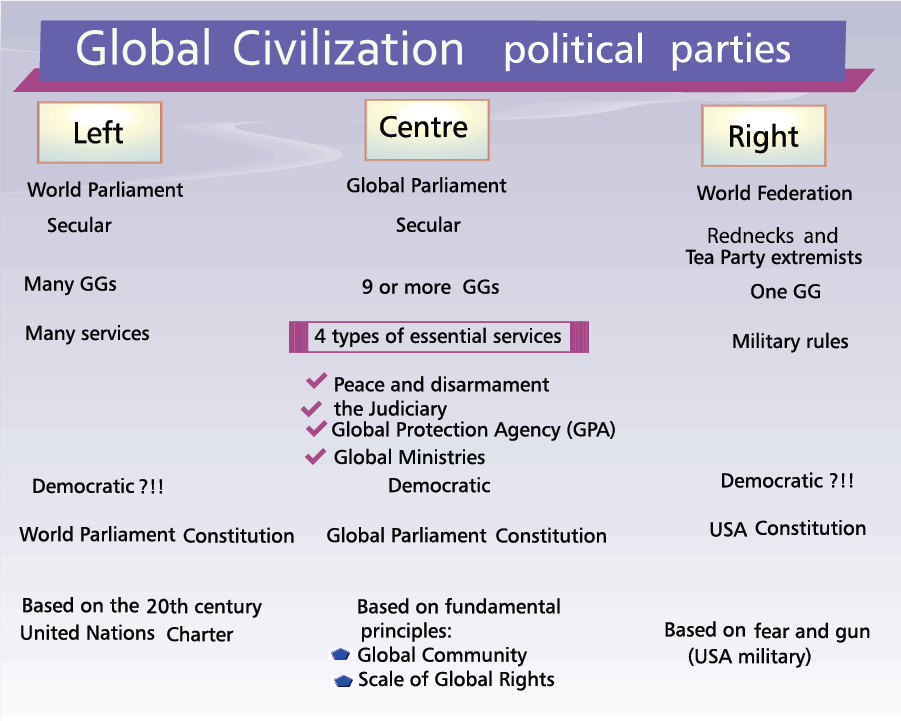
( see enlargement
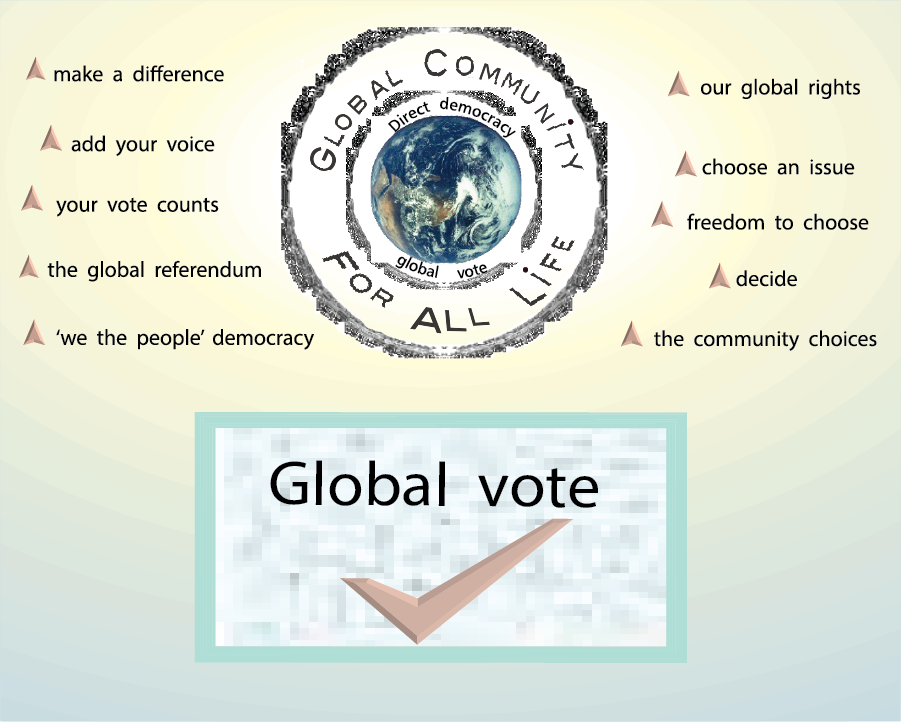
( see enlargement
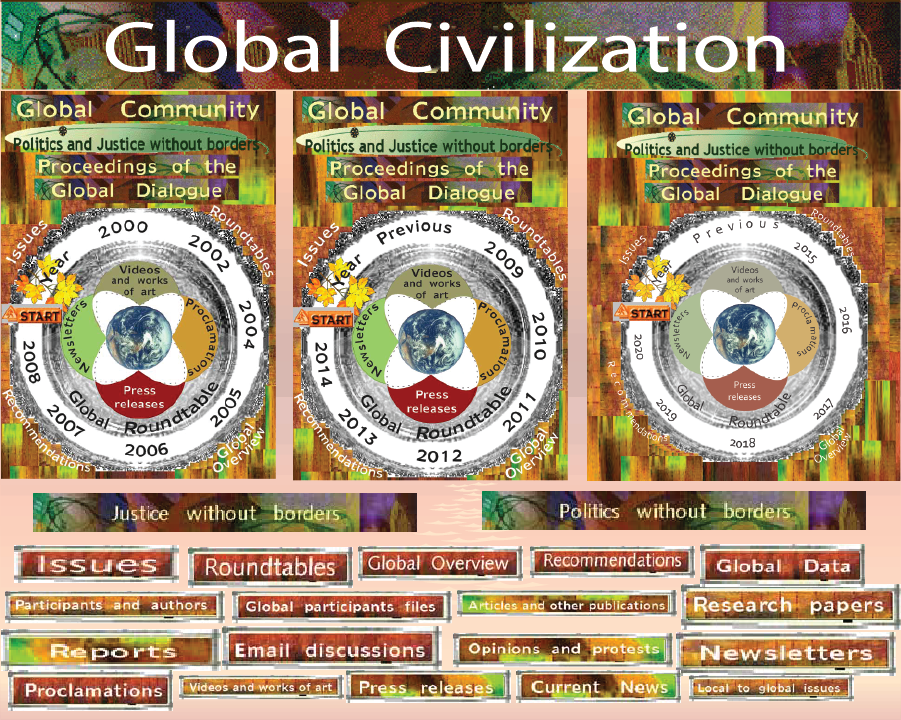
( see enlargement

